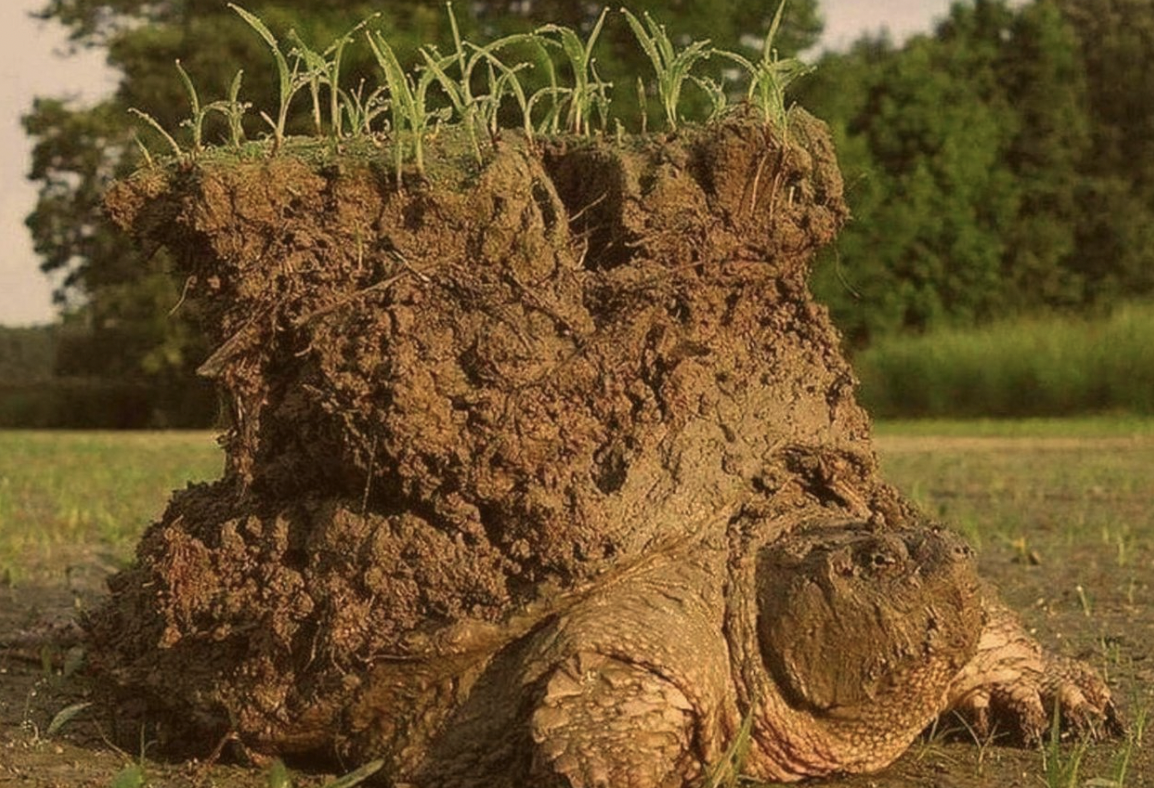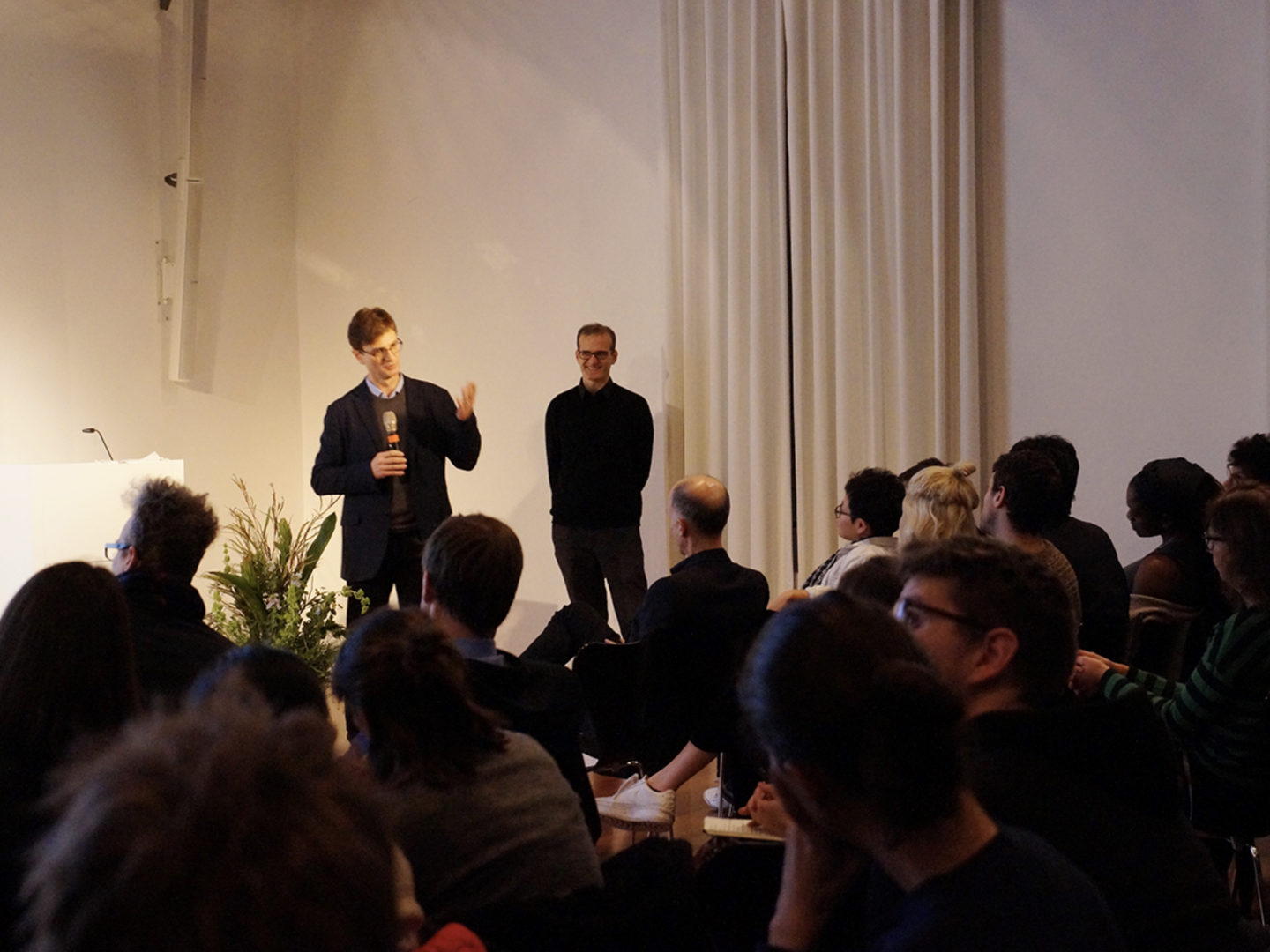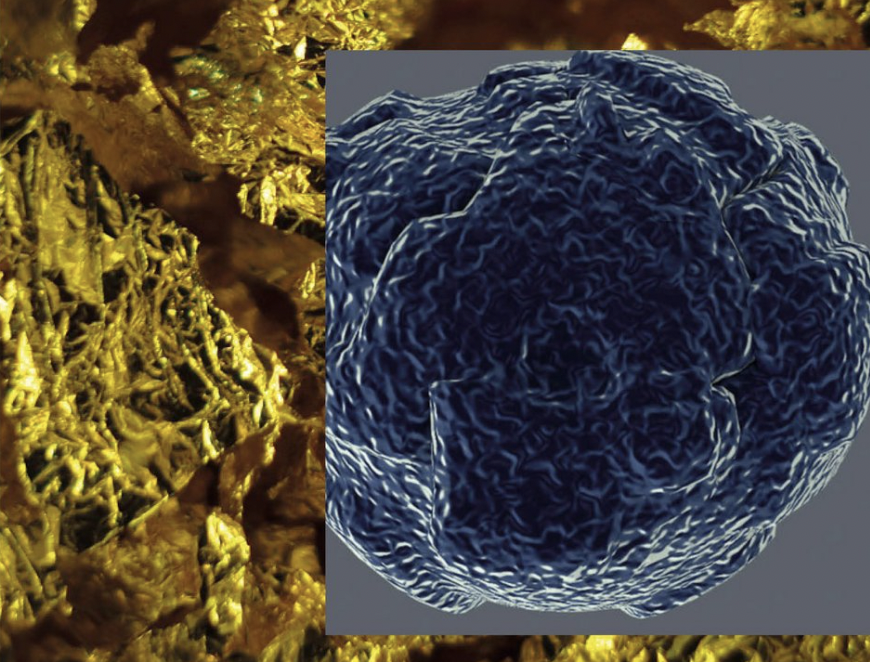Events and Activities of the Faculty of Italian Culture and Society
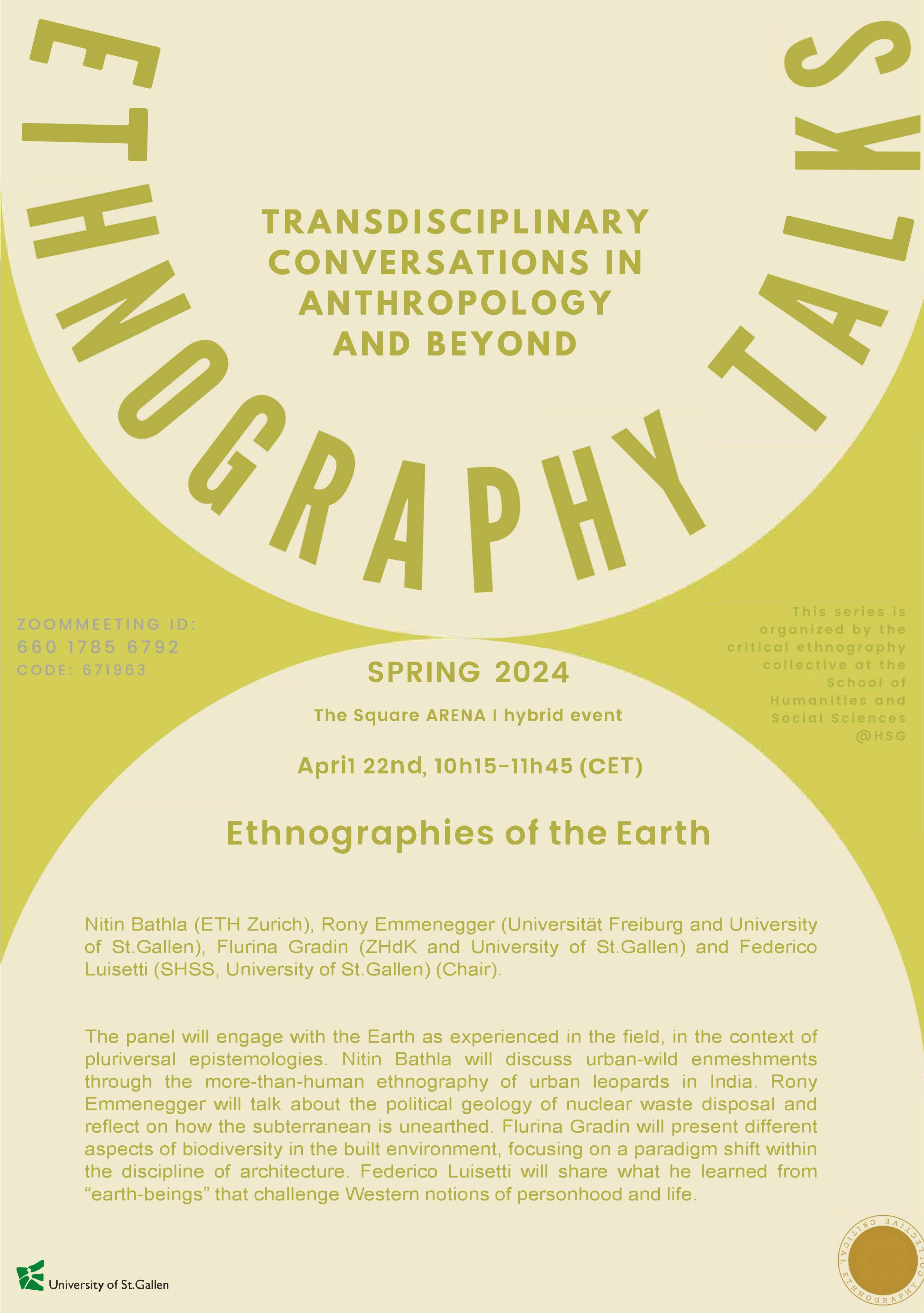
Ethnographies of the Earth
April 22, 2024
10:15 – 11:45 am
Hybrid Event
Transdisciplinary conversations in anthropology and beyond. With Nitin Bathla, Rony Emmenegger, Flurina Gradin, Federico Luisetti.
The panel on April 22 will engage with the Earth as experienced in the field, in the context of pluriversal epistemologies. Nitin Bathla will discuss urban-wild enmeshments through the more-than-human ethnography of urban leopards in India. Rony Emmenegger will talk about the political geology of nuclear waste disposal and reflect on how the subterranean is unearthed. Flurina Gradin will present different aspects of biodiversity in the built environment, focusing on a paradigm shift within the discipline of architecture. Federico Luisetti will share what he learned from “earth-beings” that challenge Western notions of personhood and life.
More information here.
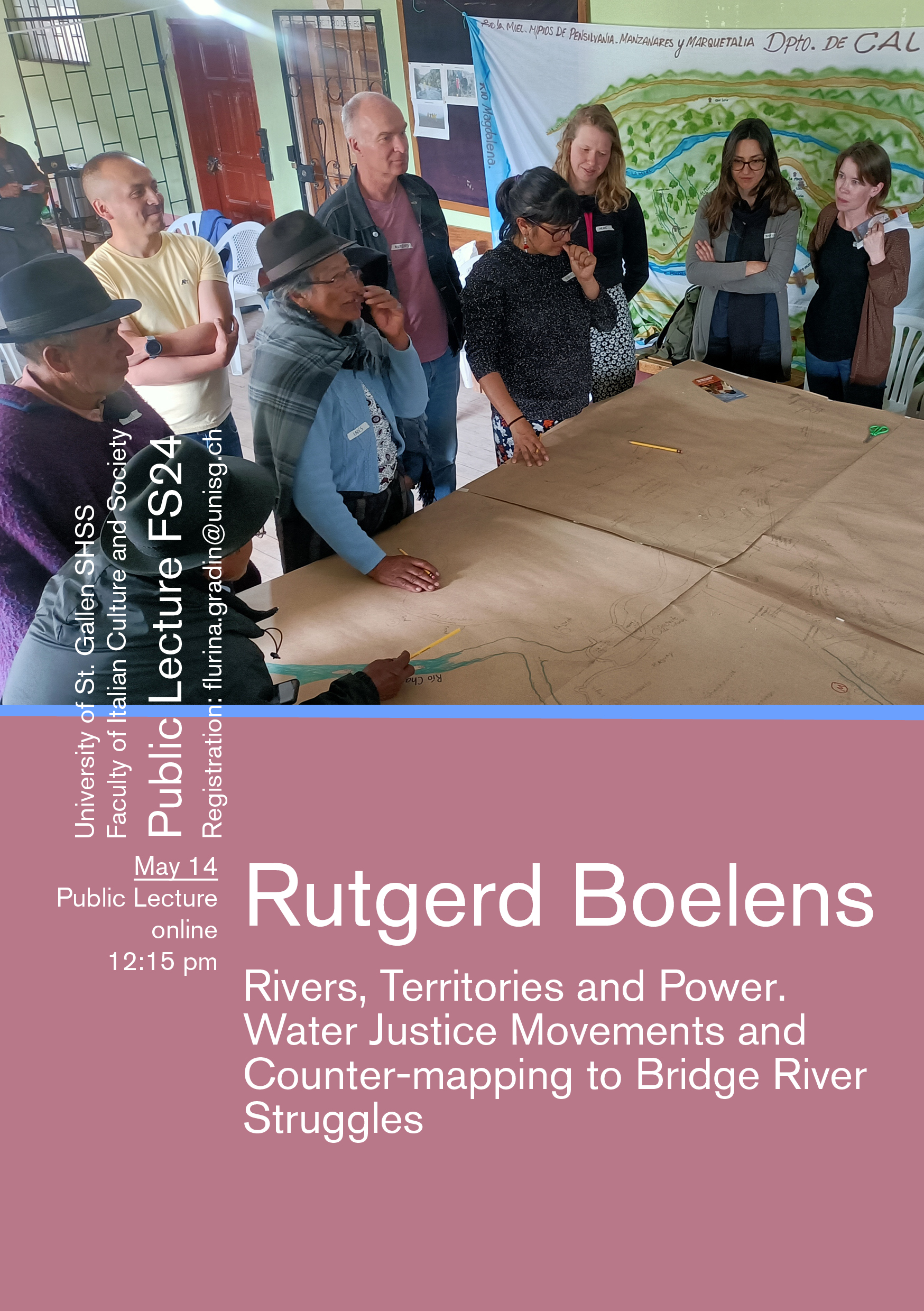
Public Guest Lecture FS24
The faculty of Italian Culture and Society at the University of St. Gallen is pleased to invite you to the Spring 2024 guest lecture:
Rutgerd Boelens
Rivers, Territories and Power. Water Justice Movements and Counter-mapping to Bridge River Struggles
Tuesday, May 14, 12:15 - 1:45 pm CEST
Online lecture: please register in advance here: meeting registration
Mega-damming, pollution and depletion endanger rivers worldwide. Modernist imaginaries of ordering ‘unruly waters and humans’ have become cornerstones of hydraulic-bureaucratic and capitalist development. They separate hydro/social worlds, sideline river-commons cultures, and deepen socio-environmental injustices. However, myriad new water justice movements (NWJMs) proliferate: rooted, disruptive, transdisciplinary, multi-scalar coalitions that deploy alternative river–society ontologies, bridge South–North divides, and translate river-enlivening practices from local to global and vice-versa. In this guest lecture, Rutgerd Boelens presents a collective framework that conceptualizes ‘riverhood’ to engage with NWJMs and river commoning initiatives. It suggests four interrelated ontologies, situating river socionatures as arenas of material, social and symbolic co-production: ‘river-as-ecosociety’, ‘river-as-territory’, ‘river-as-subject’, and ‘river-as-movement’. Boelens further examines the Traveling Rivers initiative, linking grassroots activists, engaged academia and river commoning struggles through counter-mapping. Making rivers actively travel among six river conflict arenas in Colombia and Ecuador, the initiative seeks new grass-rooted understandings capable of strengthening ‘rivers of resistance’ that break away from river grabbing and imposed status quo river governance.
Rutgerd Boelens is Professor ‘Water Governance and Social Justice’ at Wageningen University, The Netherlands, and Professor ‘Political Ecology of Water’ with CEDLA, University of Amsterdam. He is also a Visiting Professor at the Catholic University of Peru and the Central University of Ecuador. He coordinates the Justicia Hídrica/Water Justice alliance and the international research and action programs “Riverhood” and “River Commons” (www.movingrivers.org). Boelens research focuses on political ecology, water rights, legal pluralism, water cultures and cultural politics, governmentality, hydrosocial territories, river politics, environmental justice and social mobilization, mainly in Latin America and Europe. Recent books: “Water, Power and Identity. The Cultural Politics of Water in the Andes”, “Water Justice”, Cambridge University Press (with T. Perreault & J. Vos), Publications, see: www.researchgate.net/profile/Rutgerd-Boelens and https://research.wur.nl/en/persons/rutgerd-boelens/publications/ and https://wageningen-ur.academia.edu/RutgerdBoelens.

Primo Levi traduttore – tradurre Primo Levi
Forum per l’italiano in Svizzera (Le mille facce della traduzione)
Tavola rotonda in lingua italiana
Giovedì 14 novembre 2024
Programma
- 14:00 Federico Luisetti (Università di San Gallo): apertura dei lavori
- 14:30 Martina Mengoni (Università di Ferrara): Primo Levi e Heinz Riedt. Un carteggio sulla traduzione
- 15:15 Giacomo Jori (Università della Svizzera italiana): Oscurità e traduzione in Primo Levi
- 16:00 Pausa
- 16:30 Katharina List (Universität Eichstätt): Tradurre in tedesco Primo Levi poeta. Nuove proposte
- 17:15 Marco Menicacci (Università di San Gallo): Primo Levi: poesia, amore, traduzione
- 18:00 Discussione
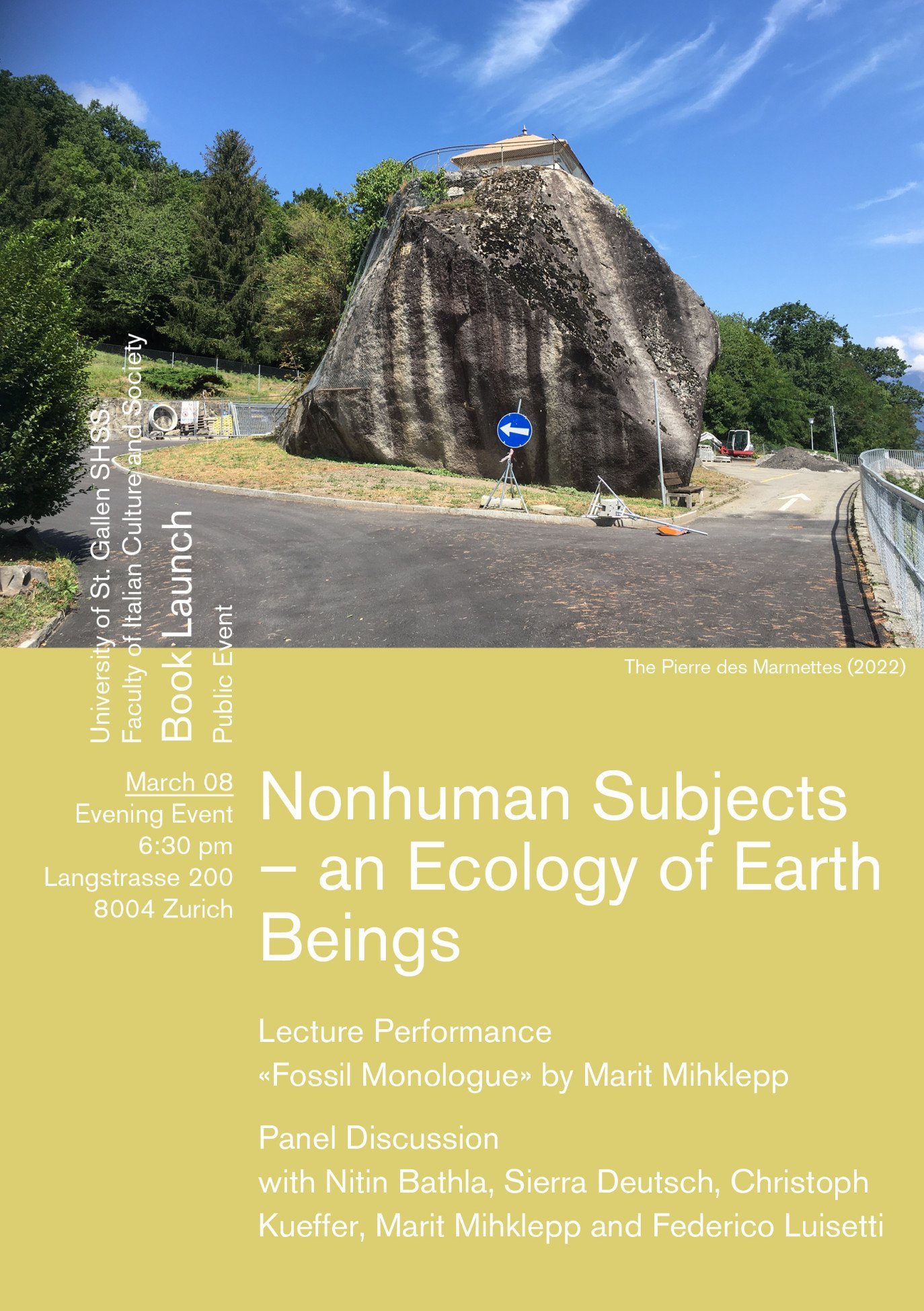
Nonhuman Subjects – An Ecology of Earth Beings
The publication «Nonhuman Subjects – An Ecology of Earth Beings» by Federico Luisetti explores an ecology of nonlife, geobodies that question deep-seated Western notions of personhood: mountains in the Andes, erratic boulders, a landfill in the Swiss Alps, the sacred stones of the Standing Rock Sioux Reservation, and the works of contemporary artists who have engaged with nonhuman subjects.
Book Launch
Friday, March 8, 6:30 pm CET
Langstrasse 200
8005 Zürich
The launch opens with an artistic lecture performance, followed by a roundtable discussion with guests and the book’s author, who will engage with nonhuman subjectivities from multiple perspectives. The event will close with an informal aperitiv provided by the University of St. Gallen. Please join us to celebrate the launch of the publication on Friday March 8 2024 at 6:30 pm, Langstrasse 200, 8005 Zurich.
With: Nitin Bathla, Sierra Deutsch, Christoph Kueffer, Marit Mihklepp and Federico Luisetti
Nithin Batla
Nitin Bathla is a lecturer and postdoctoral researcher at the Department of Architecture, ETH Zürich, where he coordinates the doctoral program at the Institute of Landscape and Urban Studies. He lectures on urban studies and political ecology, and his current research focuses on agrarian questions in the planetary age. In his academic practice, Nitin actively combines research with artistic practices of filmmaking, and socially engaged art. His 2020 film Not Just Roads, with Klearjos E. Papanicolaou, premiered at several important film festivals and won the SAH Film Award 2022.
Sierra Deutsch
Sierra Deutsch is a senior scientist in Space, Nature and Society and group leader of Geographies of Socio-Ecologies and Just Transformations (EcoJusT) in the Geography Institute at the University of Zürich. She has spent her research career expanding her understanding of the shared root causes of environmental breakdown and social injustices from multiple disciplinary lenses, including biology, critical Indigenous studies, sociology, and political ecology. Her academic background is enhanced by her work in industry, government, NGO, and humanitarian capacities, and her experiences from living and working in 7 countries on 5 continents. Currently, her main focus is on engaging her full range of experience to assess and enhance multi-scalar transformative solutions towards more just and sustainable futures.
Christoph Kueffer
Christoph Kueffer is professor of Urban Ecology at the Landscape Architecture School in Rapperswil (OST - Eastern Switzerland University of Applied Sciences), senior scientist (Privatdozent) at ETH Zurich, an affiliated professor at the Division of Arts and Cultures at Franklin University Switzerland in Lugano, and a researcher at the Institute of Experimental Design and Media Cultures (IXDM) at the FHNW Academy of Art and Design in Basel. He studied Environmental Sciences at ETH Zurich, and completed his PhD in plant ecology and habilitation in plant and global change ecology at the same university. Christoph’s current research focuses on urban ecology, biodiversity conservation in novel and human-dominated ecosystems, global change impacts on island and mountain ecosystems, and environmental humanities.
Marit Mihklepp
Marit Mihklepp is an Estonian artist who focuses on learning from and relating to the more-than-human bodies and timescales. She studied textile design in Estonian Academy of Arts and interdisciplinary art in Royal Academy of Art, The Hague. Marit is a PhD candidate in University of Art and Design Linz and Zurich University of the Arts, searching for forms of storytelling beyond human, circling around meteorites, myths and measuring.
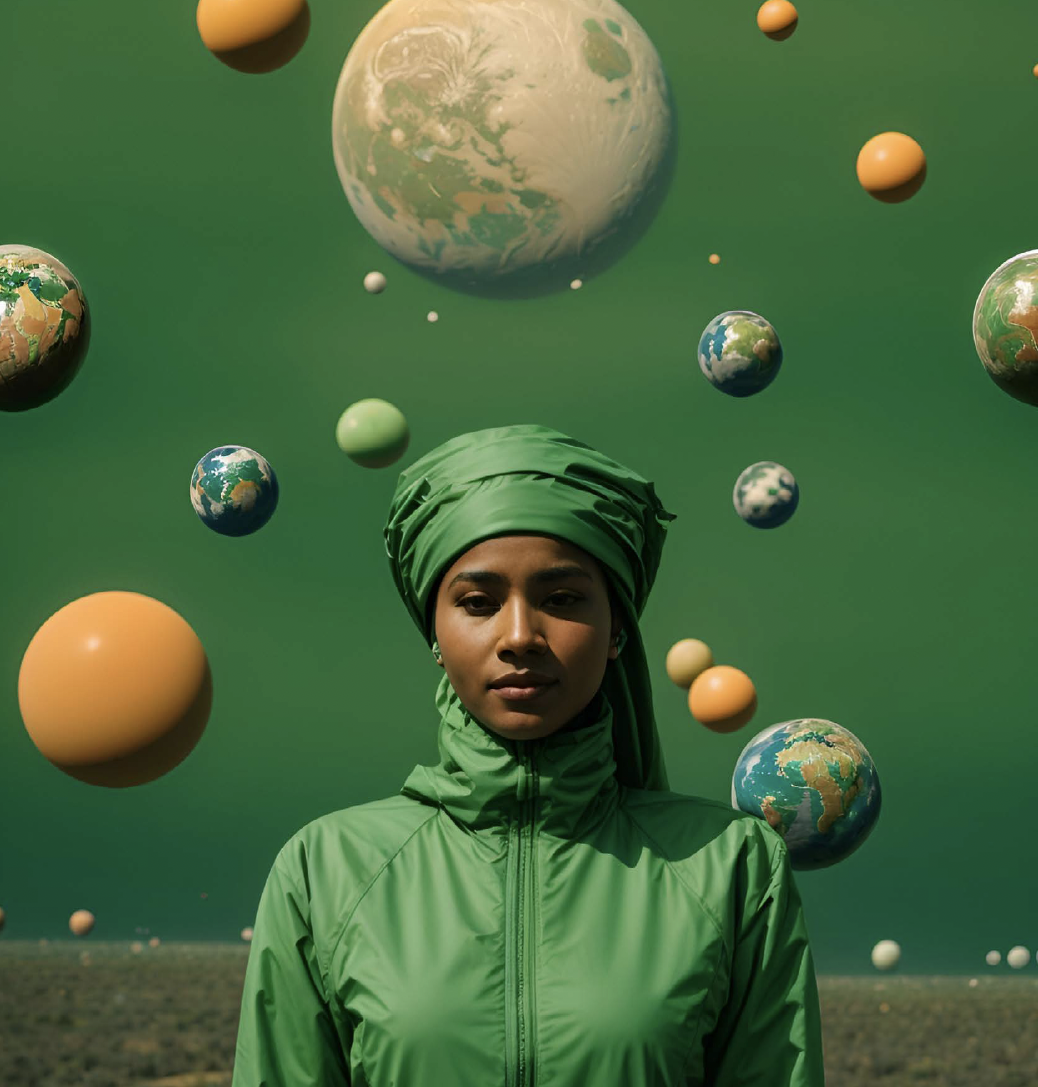
Compass for the future - Anniversary series of the Public Programme Autumn Semester 2023
To mark the 25th anniversary of the University of St.Gallen, the Public Programme is organising an extraordinary anniversary series. Within this series, our six schools are opening panel discussions that bring together students, alumni, experts and interested parties on current topics. The aim is to promote intergenerational dialogue on the past, present and future with the help of multi-perspectivity.
From the Anthropocene to the Pluriverse: Planetary Sustainability in an Age of Global Climate Disruption
School of Humanities and Social Sciences (SHSS-HSG)
1November 16, 2023, 6.15–7.45
pm
Speaker: Federico Luisetti, Elisa Fornalé, Flurina Gradin
Moderation: Sieglinde Geisel
Further information here
According to many scientists, the geological epoch of climate equilibrium known as the Holocene – which has allowed humans to become the protagonists of natural history and develop their civilizations – is now over. Extracting and burning fossil fuels has altered the Earth's metabolism: the concentration of carbon dioxide in the atmosphere has surpassed 400 parts per million, almost twice the amount that has characterized the 11,700-year long ecological niche of the Holocene. We are living in a dangerous new climate regime, which brings us back to the extreme environmental conditions that our human ancestors experienced during prehistory. The name for this current epoch is the “Anthropocene”, a time of global environmental crisis. As a solution to the dilemmas posed by the Anthropocene, together with experts in urban studies, public law and design, we will explore the potential of a utopian narrative coming from the Global South: the “Pluriverse”, a paradigm for planetary sustainability.
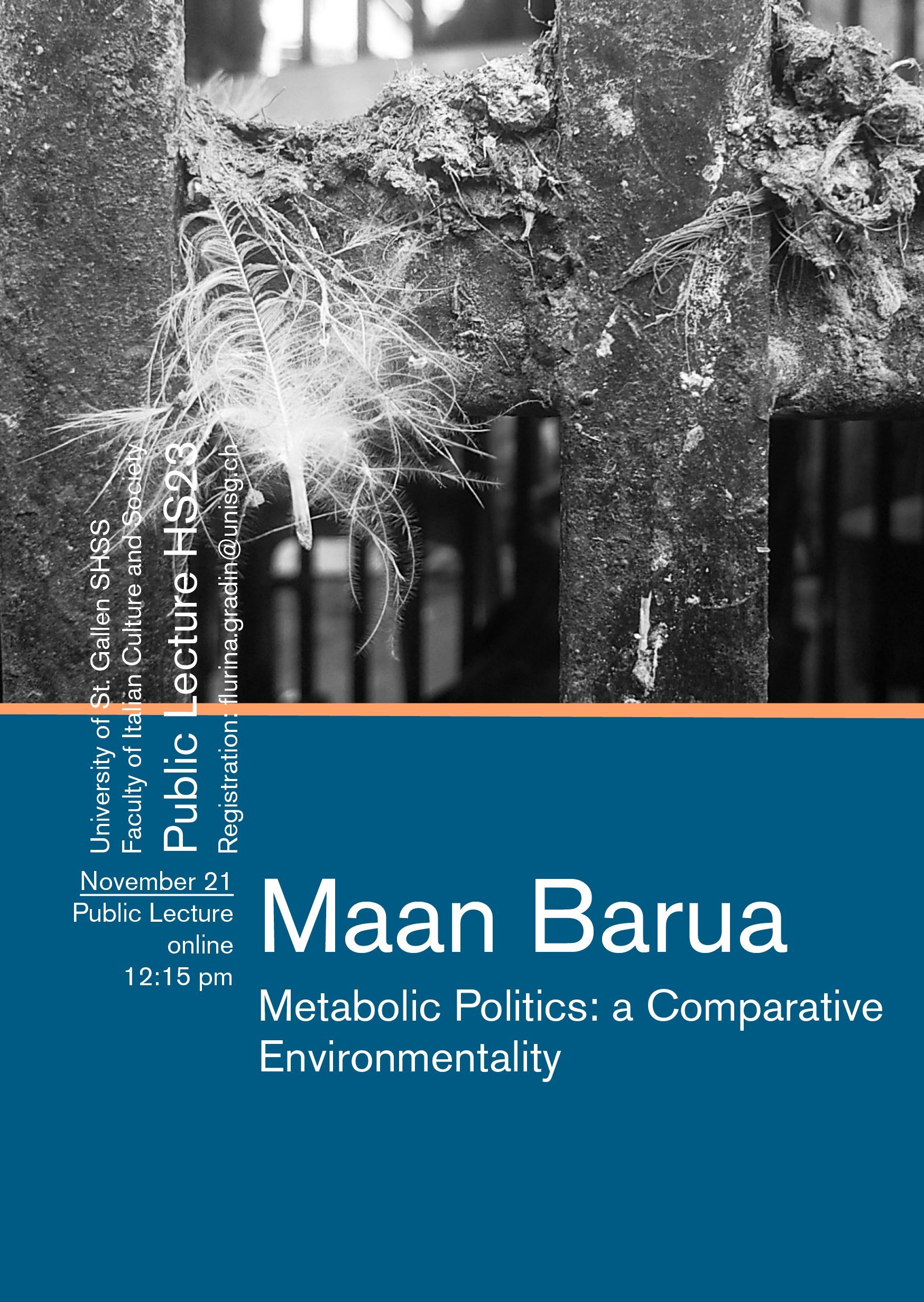
Public Guest Lectures HS23
The faculty of Italian Culture and Society at the University of St. Gallen is pleased to invite you to the Fall 2023 guest lecture:
Maan Barua
Metabolic Politics: a Comparative Environmentality
Tuesday, November 21, 12:15 - 1:30 pm CET
Online lecture: please register in advance here: meeting registration
This talk is about emerging modes of power that shift the focus from discipline and deviant populations, or what Foucault termed biopolitics, to actions and interventions in a living and material milieu. One dimension of this shift is metabolic politics: or how the transformation of materials by living entities and the circulation of substances across bodies and environments become object-targets of regulation and through which contemporary governance unfolds.
The talk first fleshes out metabolic politics via the governance of pollution caused by the poultry industry in the UK. It then turns to a postcolonial context - India - to provincialize metabolic politics and to foreground how this dispositif of power is neither hegemonic nor the same everywhere. The talk summarizes key features of a metabolic politics that is attentive to difference and history, and discusses what a focus on the metabolic tells us about the economization and governance of life.
Maan Barua works on the ontologies, economies and politics of the living and material world. His work is at the intersections of posthumanism, political economy and postcolonial thought. His current research spans four thematic areas: urban ecologies and urban surrounds, biocapital and postcolonial environments. Maan is the PI on an ERC Horizon 2020 Starting Grant Urban Ecologies, and is a University Lecturer in Human Geography at the University of Cambridge. His book Lively Cities: Reconfiguring Urban Ecology was published in 2023 (Minnesota University Press), and a second monograph, Plantation Worlds will be published by Duke University Press in fall 2024.
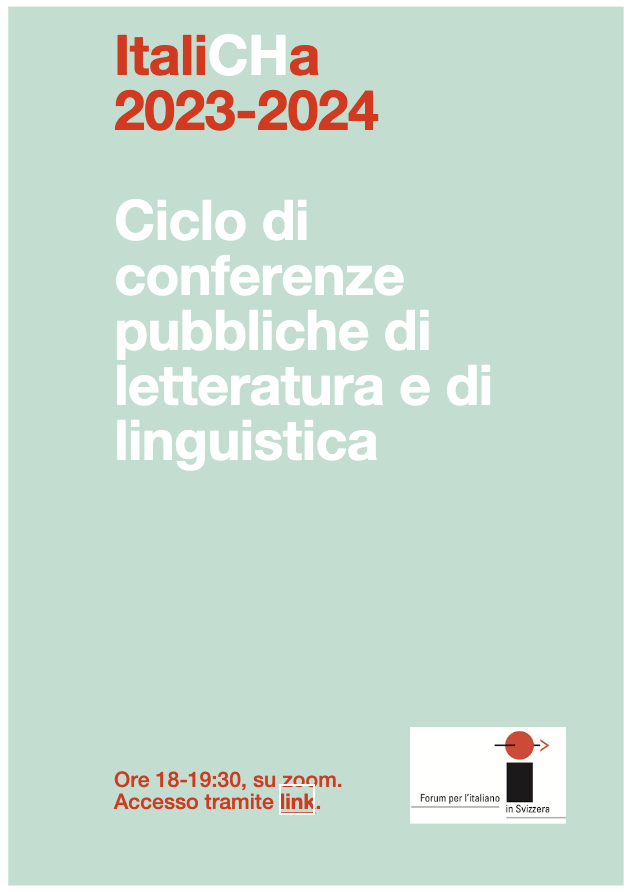
Ciclo di conferenze pubbliche di letteratura e di linguistica
Between April 2023 and March 2024, the new conference cycle Italy(CH)a 2023-2024 takes place. The interlocutors involved are young researchers in literature and linguistics who carry out research activities at the various chairs of Italian study in Switzerland. The event series takes place online and is open to the public.
"Dissipatio H.G." di Guido Morselli e la sua possibile collocazione all’interno dei dibattiti critici sull’Antropocene»
March 21, 2024
6 - 7:30 pm
Speaker: Emiliano Guaraldo
Event program and more information here
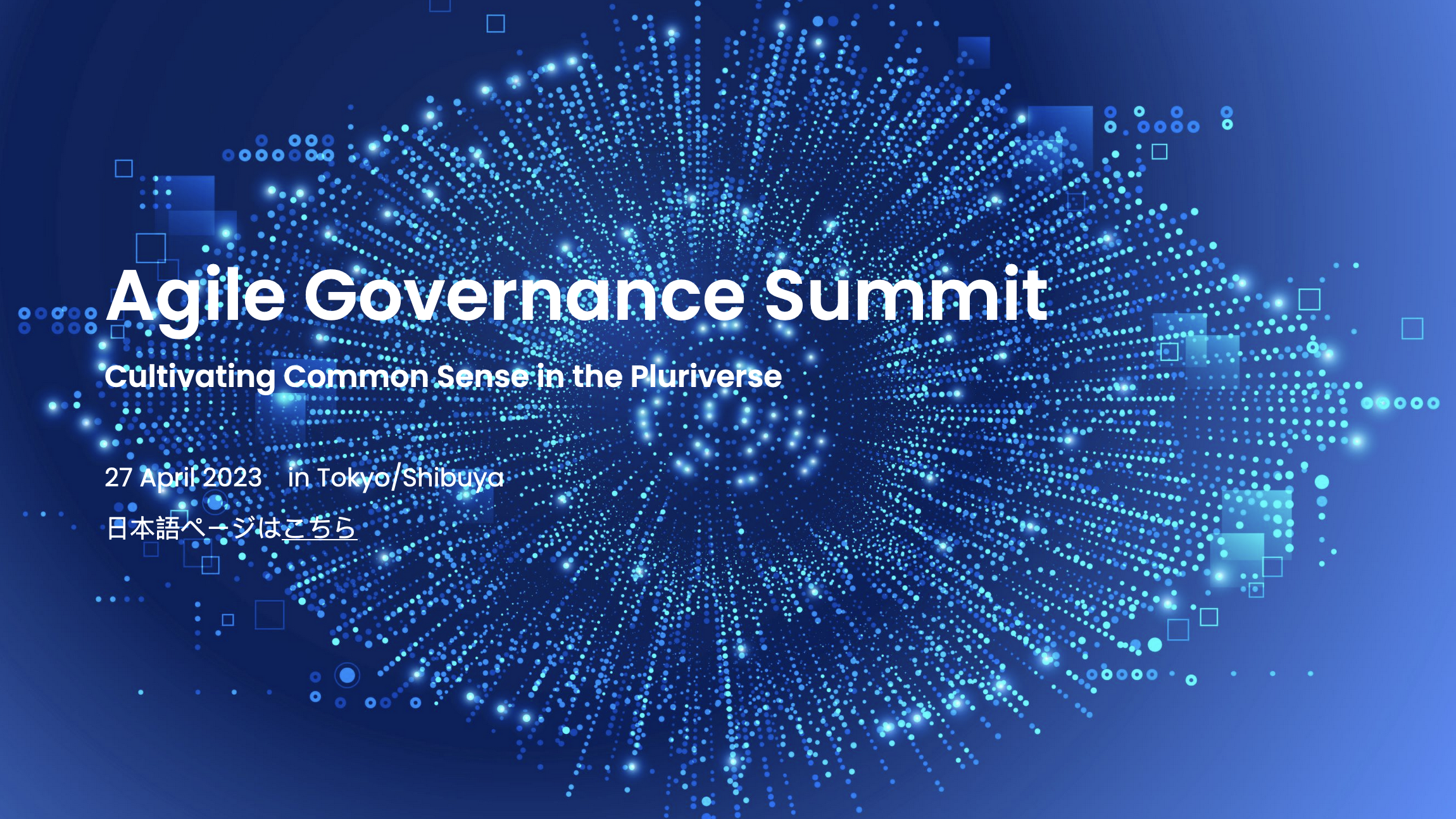
World Economic Forum Agile Governance Summit 2023
April 27, 2023, Tokyo, Shibuya
World Economic Forum
Agile Governance Summit of the G7 Digital and Tech Ministers’ Meeting
Governance Principles – Cultivating Common Sense in the Pluriverse
Keynote lecture at the opening session by Federico Luisetti. More information here
The Agile Governance Summit of the World Economic Forum is a side event of the G7 Digital and Tech Ministers’ Meeting. Summit discussions and related task forces aim to offer recommendations to the G7 on governance issues and common guidelines in a CPS society.
In the opening session, Federico Luisetti will introduce the concept of the Pluriverse, a decolonial notion describing heterogeneous communities and ecosystems. The talk will explore the principles of a relationship-centered ontology in which humans and nature coexist and prosper through interconnectedness.
Read more in the interview with Federico Luisetti about the pluriverse and the influence of philosophy on politics (published on April 12, 2023)
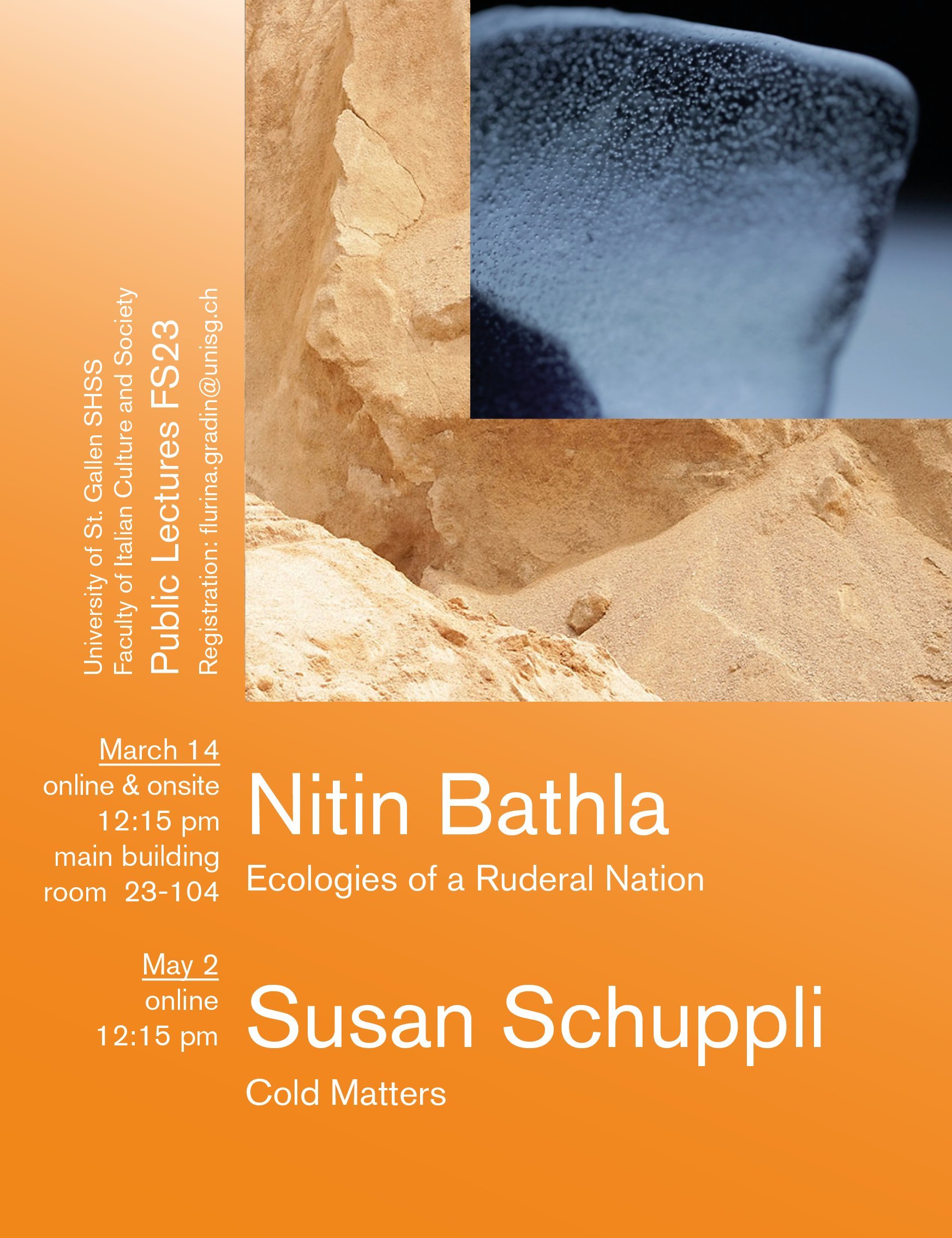
Public Guest Lectures FS23
The faculty of Italian Culture and Society at the University of St. Gallen is pleased to invite you to the Spring 2023 guest lectures:
Nitin Bathla
Ecologies of a Ruderal Nation
Tuesday, March 14, 12:15 - 1:30 pm CEST
Online and Onsite lecture.
Join at UNISG: Main Campus, room 23-104
Join Online: please register in advance here: meeting registration
The Indian countryside has been subject to such an extensive process of state-making in the last two decades that the spatial binaries of urban and rural seem to have sublated into the ruderal. New highway and infrastructure corridors are being laid out across the country at an unprecedented rate bringing extended urbanization into previously bypassed zones of nature conservation and rural autonomy. This is not only giving rise to uneven development but also to new ecologies that refract colonial ideas of waste and improvement, making commons and public lands available to processes of global value creation. However, these ruderal landscapes also become sites where counter-ecologies are produced and contested. This lecture examines the incipient environmental imaginaries and ecologies under ruderal nation building.
Nitin Bathla is a lecturer and postdoctoral researcher at the Department of Architecture, ETH Zürich, where he coordinates the doctoral program at the Institute of Landscape and Urban Studies. He lectures on urban studies, and political ecology, and his current research focuses on agrarian questions under the planetary age. In his academic practice, Nitin actively combines research with artistic practices of filmmaking, and socially engaged art. His 2020 film Not Just Roads with Klearjos E. Papanicolaou premiered at several important film festivals and won the SAH Film Award 2022.
–
Susan Schuppli
Cold Matters
Tuesday, May 2, 12:15 - 1:30 pm CEST
Online lecture
Please register in advance here: meeting registration
Environmental systems and the transformations brought about by global warming are also generating new forms of evidence; creating, in effect, a planetary archive of material witnesses. In this lecture Susan Schuppli expands upon ideas developed in her concept of the “material witness". Much of this work has been developed through the multi-year “Learning from Ice” Project, which reflects upon the ways in which the different knowledge practices mediated by ice as well as the differential experiences of cold are entangled with legal questions, human rights violations but also claims for social and environmental justice.
Susan Schuppli is Director of the Centre for Research Architecture, Goldsmiths University of London, where she is also an affiliate artist-researcher and Board Chair of Forensic Architecture. Her current work focuses on learning from ice and the politics of cold, and includes a series of documentary film projects: Ice Cores (2019), Artic Archipelago (2021), Not Planet Earth (2021), Cold Cases (2021-22), Gondwana (2022), and a COP26 Creative Commission (Listening to Ice) sponsored by the British Council, which involved scientific and community-based work at Drang Drung Glacier in Ladakh, India. Her first vinyl LP "ICE RECORDS" was released by BEK Norway last year. Schuppli has published widely within the context of media and politics, and is author of the book, Material Witness published by MIT Press in 2020.
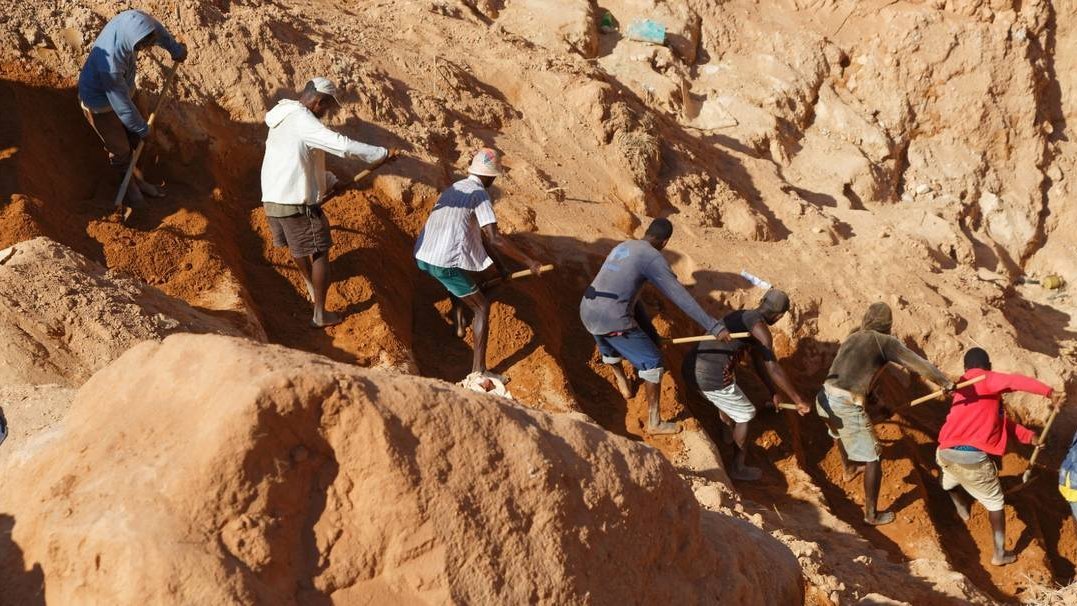
Federico Luisetti: Sustainability should overcome the power imbalance between the Global North and South
An article in the magazine of the University of St. Gallen "HSG Focus" - "Deglobalization" issue
As a philosopher at the HSG, Federico Luisetti is concerned with the understanding of sustainability and with political ecology. This interdisciplinary field combines political, social, and environmental perspectives and examines the complex relationships between the environment and society.
Read the full article on sustainability, the unequal distribution of resources, and the legal personality of living beings here. (The article is only available in German)
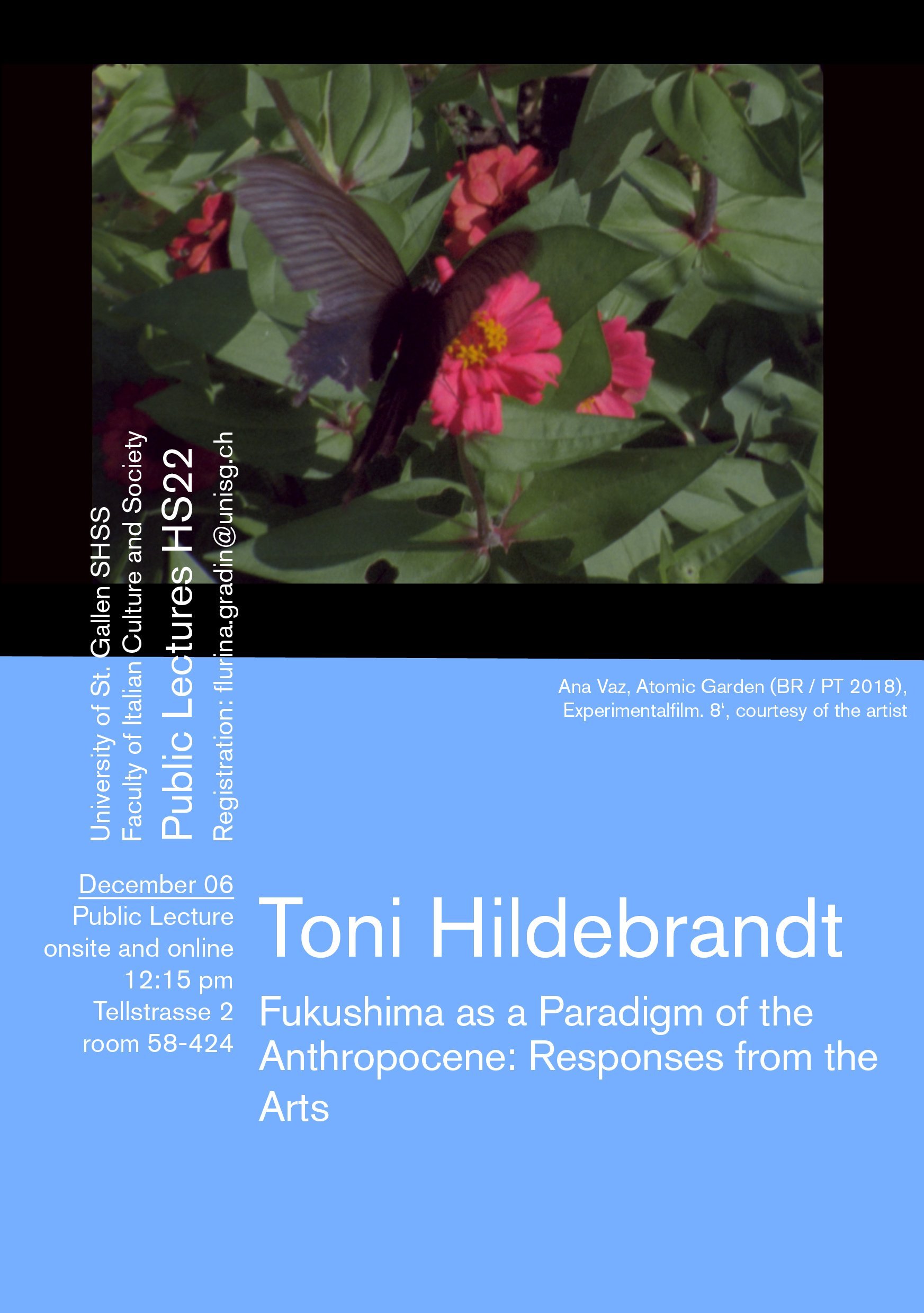
Toni Hildebrandt: Fukushima as a Paradigm of the Anthropocene: Responses from the Arts
Tuesday, December 6, 2022, 12:15 – 2 pm, University of St. Gallen (online and on site event, please register here to join online)
The talk is part of the research project (Post-)apocalyptic Imaginations: Representations of Nuclear Catastrophes in Art and Film 1945-2011 that stretches from the atomic bombings of Hiroshima and Nagasaki in 1945 to the Fukushima nuclear disaster in 2011. The term „Hiroshima“ referred in paradigmatic films such as Hiroshima mon amour (1959) to problems of cultural memory, the archive, the witness, and human experience. In similar ways, „Fukushima“ points to epistemic shifts that are crucial to the understanding of the „Nuclear Anthropocene“.
The lecture will examine three responses to the Fukushima disaster from the arts. Filmmaker Ana Vaz, artist and theatre director Akira Takayama, and Ikebana master Atsunobu Katagiri react to the catastrophe with works that decentralize the human, paying attention to flowers, fireworks, gardens, insects and farm animals. In these tales of survival, the human is marginalized or temporary/spatially subtracted, to re-enter the world with a new ethical consciousness and awareness.
Toni Hildebrandt is the coordinator of the SNSF Sinergia project „Mediating the Ecological Imperative“ (in collaboration with UNAM Mexico City). After receiving his PhD in Art History at the University of Basel in 2014, he has been working at the Department of Modern and Contemporary Art History at University of Bern. Among his publications, PPPP: Pier Paolo Pasolini Philosopher (a volume co-edited with with Giovanbattista Tusa) and the essay „Post-Apocalyptic Amazement: Aesthetics and Historical Consciousness in the Natural Contract“. Toni Hildebrandt has just returned from a visiting appointment as guest researcher at the University of Tokyo and RAM/Tokyo University of the Arts.
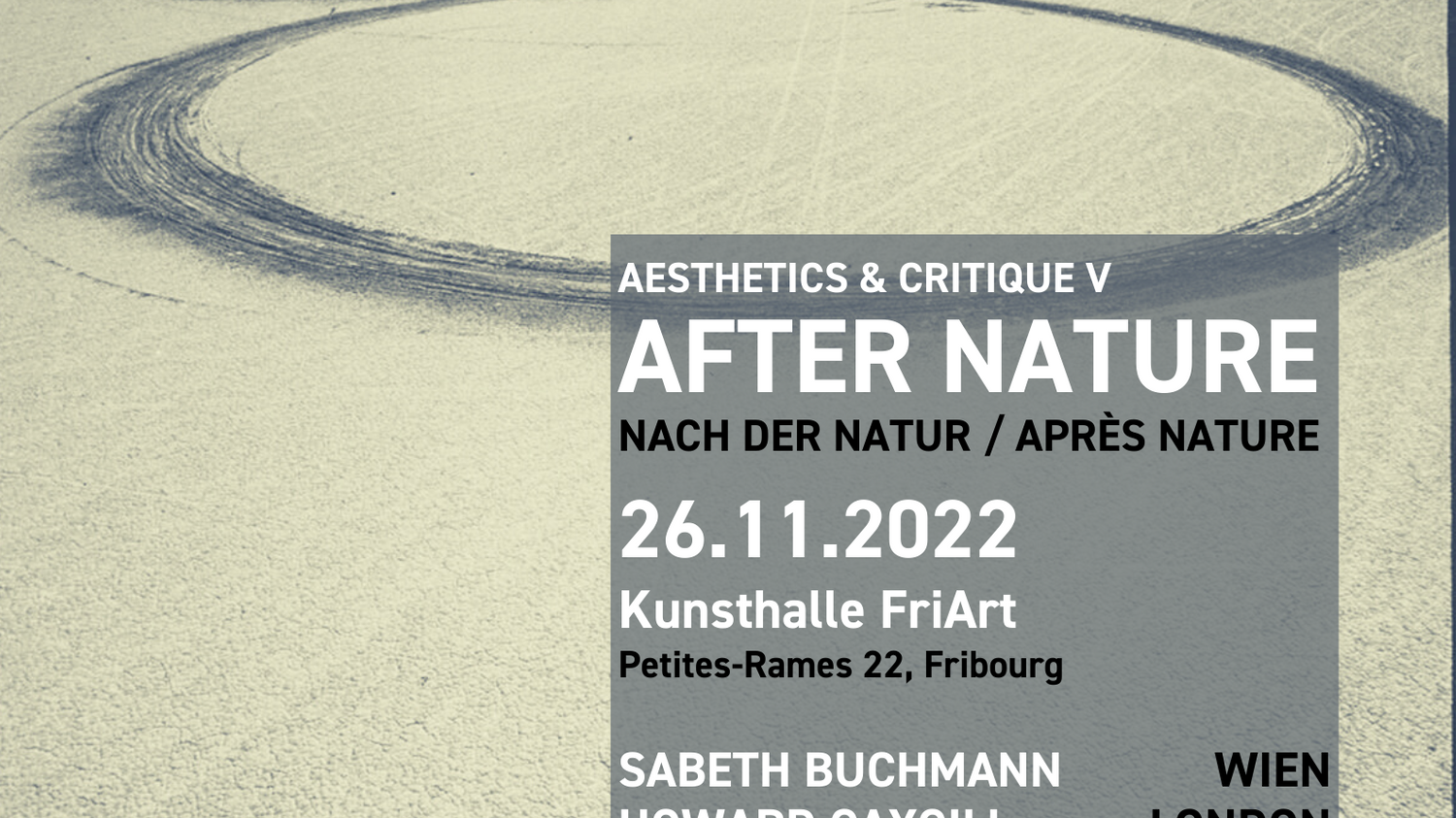
On the Crisis of Presence
Talk by Federico Luisetti and other keynote speakers at the Kunsthalle Friart, Fribourg. More Information here
For centuries, artists have been keen to paint from nature. What remains of this aesthetic project in a world where nature is revealed as already fully “anthropized”? What is left of nature, when it has lost the status of the Great Outdoors? Faced with climate emergency, other politics – but also: aesthetics – of nature become urgent. How to conceive a nature that is no longer located beyond us, but that permeates us? How to think, in return, a nature already marked by recursive processes, in short: by technique ? Perhaps nature after nature never was but that: a nature that discovers itself as having always been second nature. A nature as art.
Invited speakers:
Sabeth Buchmann (Universität Wien)
Howard Caygill (Kingston University London)
Toni Hildebrandt (Universität Bern)
Federico Luisetti (Universität St. Gallen)
Pietro Montani (Sapienza Roma)
Pauline Nadrigny (Université Paris I)
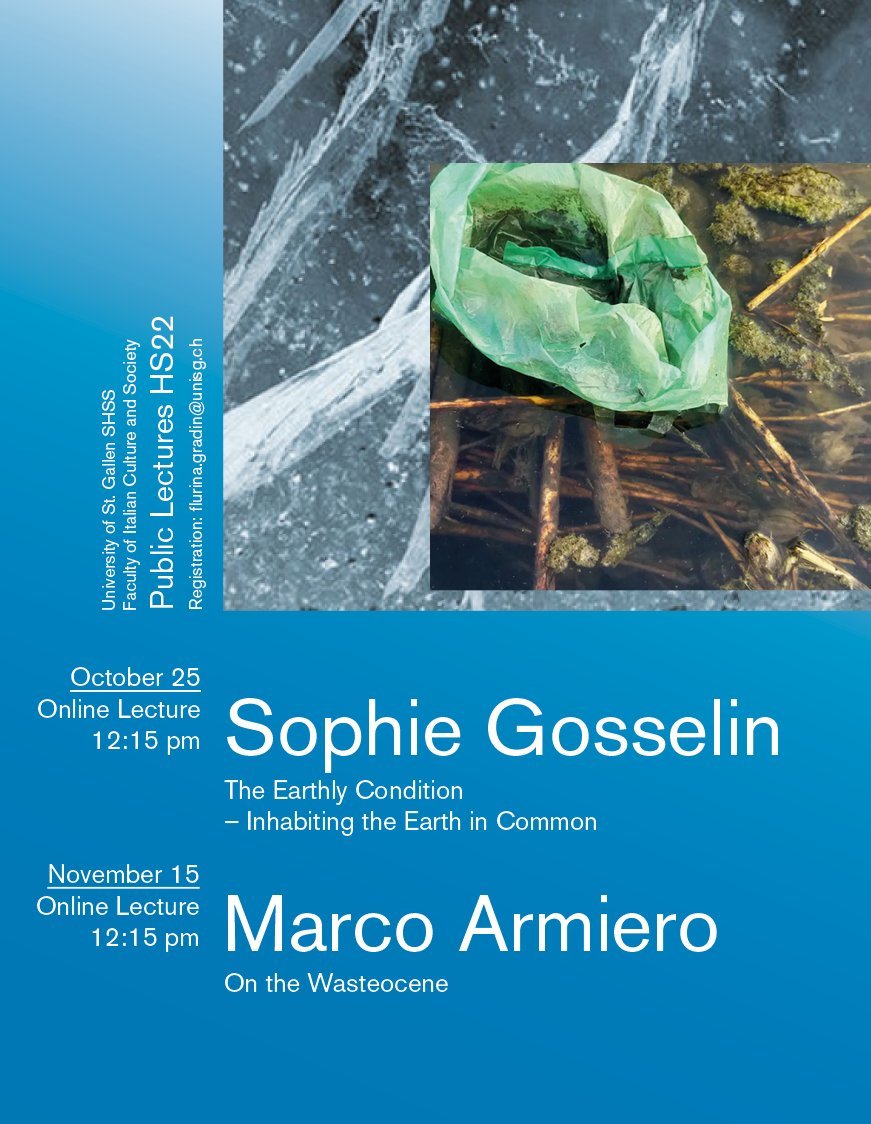
Public Guest Lectures HS22
Sophie Gosselin
The Earthly Condition – Inhabiting the Earth in Common
Tuesday, October 25, 12:15 - 1:30 pm CEST
Online lecture. Please register in advance: meeting registration
The space-time of politics is changing: the Earth and the multiplicity of beings that compose it are bursting into human affairs by reacting to the continuous assaults of a modernization front led by the State-Capital. The modern condition, driven by anthropocentric rights and political measures governed by the systematic exploitation of natural resources and the putting to work of all beings, is collapsing.
But what about opening another path: to think and live in our earthly condition? In this guest lecture, Sophie Gosselin will be talking about the shifting political landscape of modernity where the individual becomes a relational person, citizen and representative democracy becomes a multispecific assembly of inhabitants, national peoples are transformed into river peoples, mountain peoples or archipelago peoples, and state sovereignty is shared to take into account decolonial, interspecific and ecofeminist perspectives. These reinventions engage us to re-inhabit our relationships, our affects, our imaginations in order to live an Earth in common: an Earth made of many worlds.
Sophie Gosselin is a philosopher based in France. She is the co-author with David gé Bartoli of La Condition terrestre (Seuil, 2022) and Le Toucher du monde, techniques du naturer (Editions Dehors, 2019). She is a founding member of the online review Terrestres and of the University for the Earth in Tours.
–
Marco Armiero
On the Wasteocene
Tuesday, November 15, 12:15 - 1:30 pm CET
Online lecture. Please register in advance: meeting registration
Humans may live in the Anthropocene, but this does not affect all in the same way. How would the Anthropocene look if, instead of searching its traces in the geosphere, researchers would look for them in the organosphere, in the ecologies of humans in their entanglements with the environment? In this guest lecture, Marco Armiero will invite us to take a closer look at this embodied stratigraphy of power and toxicity. More than the Anthropocene, we will start a dialogue to discover the Wasteocene.
The imposition of wasting relationships on subaltern human and more-than-human communities implies the construction of toxic ecologies made of contaminating substances and narratives. While official accounts have systematically erased any trace of those wasting relationships, another kind of narrative has been written in flesh, blood, and cells. Traveling between Naples (Italy) and Agbogbloshie (Ghana), science fiction and epidemic outbreaks, the talk will take us into the bowels of the Wasteocene, but it will also indicate the commoning practices which are dismantling it.
Marco Armiero is the director of the Environmental Humanities Laboratory at the Royal Institute of Technology (KTH) in Stockholm and current president of the European Society for Environmental History. He is one of the founders of the field of environmental history in Italy. Among his publications: Wasteocene. Stories from the Global Dump (Cambridge University Press, 2021) and, with Gregg Mitman and Robert S. Emmett, Future Remains. A Cabinet of Curiosities for the Anthropocene (University of Chicago Press, 2018).
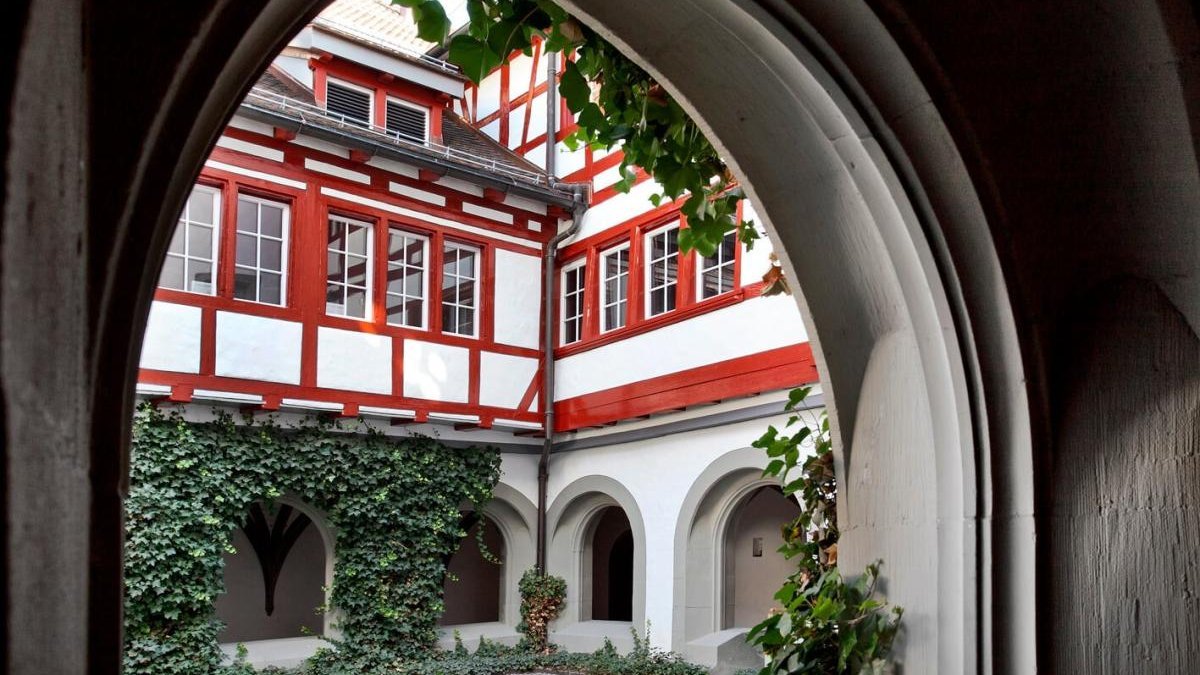
Conference "L'italofonia e il ruolo del servizio pubblico dei media"
May 7, 2022, Forum St.Katharinen, St. Gallen
The conference L'italofonia e il ruolo del servizio pubblico dei media organised by CORSI, with the Forum per l'italiano in Svizzera, follows the publication of the report "La posizione dell'Italiano in Svizzera: una sguardo sul periodo 2012-2020 attraverso alcuni indicatori", commissioned by the Forum per l'italiano in Svizzera to the Osservatorio linguistico della Svizzera italiana (OLSI) and to the Dipartimento formazione e apprendimento (SUPSI-DFA) with the collaboration of the Alta scuola pedagogica dei Grigioni (PHGR) and intends to build on the results of this study.
The research, which was carried out by Matteo Casoni (OLSI), Sabine Christopher (OLSI), Andrea Plata (SUPSI-DFA) and Maria Chiara Moskopf-Janner (PHGR), presents an analysis of the situation of Italian in the context of Swiss plurilingualism.
More information and conference program here
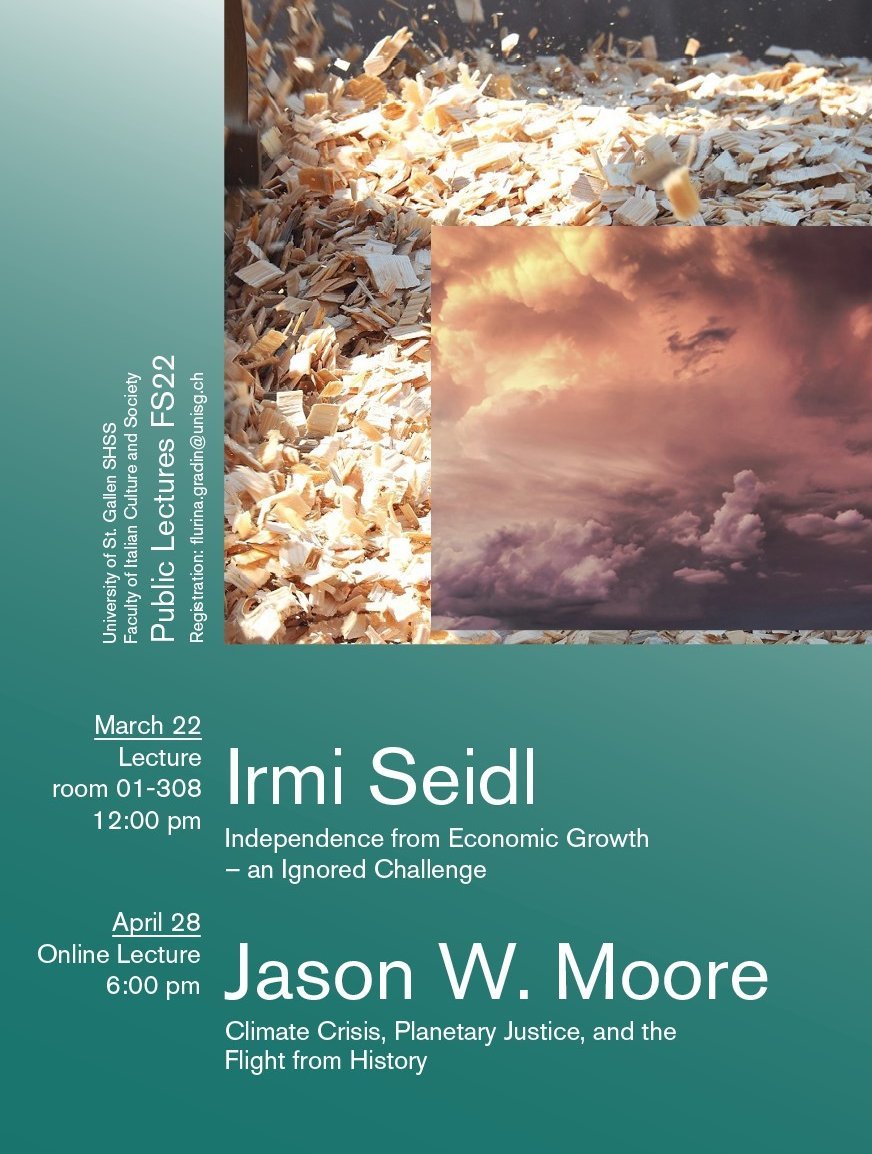
Public Guest Lectures FS22
Irmi Seidl
Independence from Economic Growth – an Ignored Challenge
Tuesday, March 22, 12:00 - 1:30 pm CET
University of St. Gallen, campus room 01-308
Continuous economic growth on a finite planet is not possible. 50 years after the Club of Rome Report “The Limits to Growth”, the focus on economic growth has not changed and instead the growth model has spread globally. The lecture embeds the growth society in history and economic theory, discusses limits to economic growth and asks the question whether absolute decoupling of economic growth and resource use is possible. It also indicates areas in which transformations can foster a departure from the growth paradigm.
Irmi Seidl is an economist and head of the Economic and Social Sciences Research Unit at the Swiss Federal Institute for Forest, Snow and Landscape Research, WSL. She is the co-editor of Post Growth Work: Employment and Meaningful Activities within Planetary Boundaries (Routledge 2021), of Postwachtum. Konzepte für die Zukunft (Metropolis 2010) and the co-author of How do social innovations contribute to growth-independent territorial development? Case studies from a Swiss mountain region (DIE ERDE 2021,https://doi.org/10.12854/erde-2021-592). Irmi Seidl teaches at the University of Zurich and ETH Zurich and conducts research on the ecological consequences of economic growth, the economics of land use and settlement development and environmental economic instruments. As a growth critic she advocates the concept of the post-growth society.
–
Jason W. Moore
Climate Crisis, Planetary Justice, and the Flight from History
Thursday, April 28, 6 - 7:30 pm CEST
online lecture. Please register in advance: meeting registration
Among the legacies of a half-century of environmental studies – across the Two Cultures – is a denial of the history of capitalism in the unfolding climate crisis. In this lecture, environmental historian Jason W. Moore explores two entangled problems in contemporary interpretations of climate crisis and climate justice. One tendency reduces the problem of Holocene climate history to Man and Nature. Rather than reconstruct the long history of class, climate, and civilizational change, we are delivered neo-Malthusian stories that are not only empirically flawed but politically disabling.
Another tendency, common across the humanities and social science, reduces the problem of capitalism to social relations abstracted from the modern history of climate and environmental change, beginning the invasions of the New World in 1492. Moore shows how today's climate crisis is rooted in the emergence of a capitalist world-ecology during the Little Ice Age, and how a politics of planetary justice that ignores that history recapitulates a "soft" climate denialism and favors an authoritarian response to the climate emergency.
Jason W. Moore is an environmental historian and historical geographer at Binghamton University, where he is professor of sociology. He is author, most recently, of Capitalism in the Web of Life(Verso, 2015), Capitalocene o Antropocene?(Ombre Corte, 2017), Anthropocene or Capitalocene? Nature, History, and the Crisis of Capitalism(PM Press, 2016), and, with Raj Patel, A History of the World in Seven Cheap Things(University of California Press, 2017). His books andessayson environmental history, capitalism, and social theory have been widely recognizedand have receivedthe Alice Hamilton Prize of the American Society for Environmental History (2003), the Distinguished Scholarship Award of the Section on the Political Economy of the World-System (American Sociological Association, 2002 for articles, and 2015 for Web of Life), and the Byres and Bernstein Prize in Agrarian Change (2011).
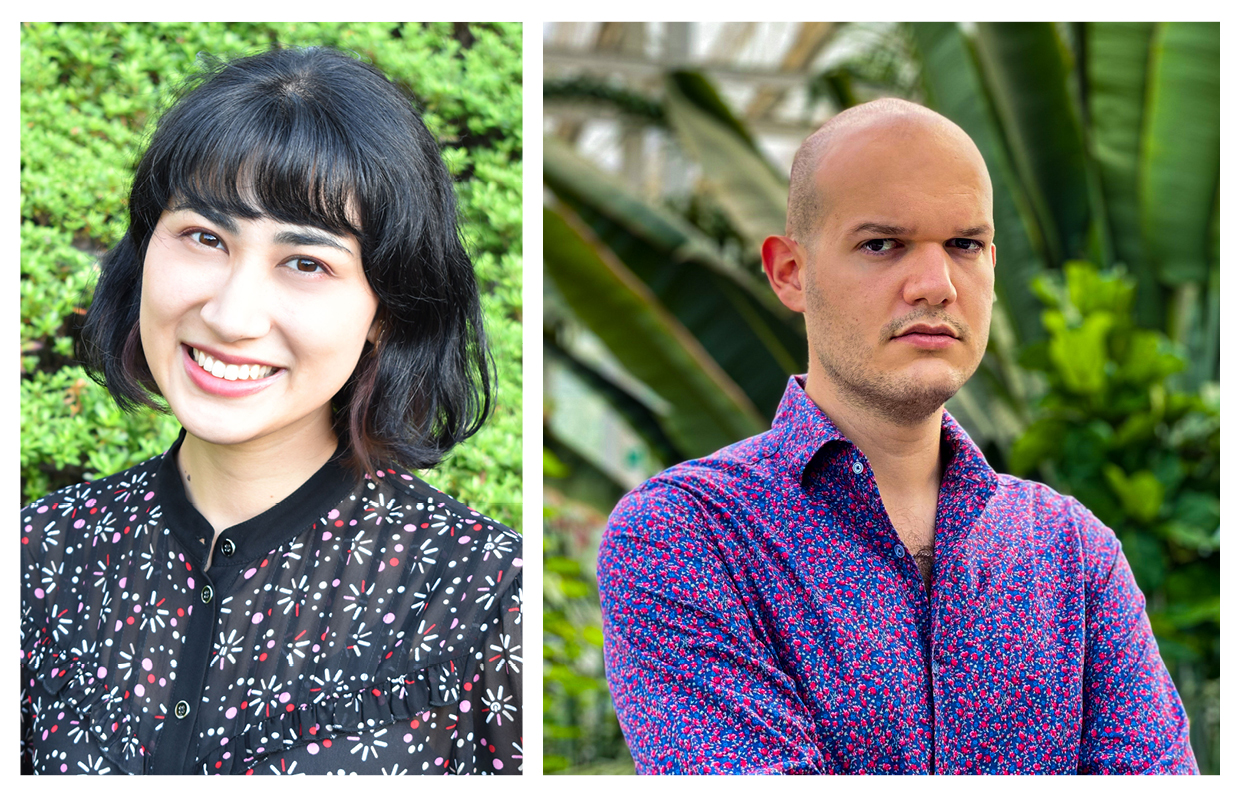
Welcome to our team!
The Italian faculty welcomes Tsunoda Kahlua (Keio University, Tokyo). Tsunoda Kahlua will join our research team from February to the end of July 2022 as a member of the Young Researchers’ Exchange Programme between Japan and Switzerland. The agreement is supported by the Leading House Asia, ETH Zurich. Tsunoda Kahlua will work under the supervision of Prof. Federico Luisetti on her current research project entitled Fotodinamismo and the Reception of Photography in Italian Futurism.
We also warmly welcome Dr. Marco Malvestio. Dr. Marco Malvestio is EU Marie Skłodowska-Curie Postdoctoral Fellow at the University of Padua and at the University of North Carolina at Chapel Hill. He will join our research team and work under the supervision of Prof. Federico Luisetti from February to the end of April 2022, in the framework of his project The Ecology of Italian Science Fiction. The project is funded by the European Commission, Horizon 2020 initiative.
Dr. Marco Malvestio’s project, “EcoSF”, explores the presence of ecological issues in Italian science fiction. Dr. Marco Malvestio holds a PhD in Comparative Literature from the University of Padua and was previously a Postdoctoral Fellow in the Department of Italian Studies at the University of Toronto. He has been visiting PhD student at the University of Cambridge and at Royal Holloway, University of London.
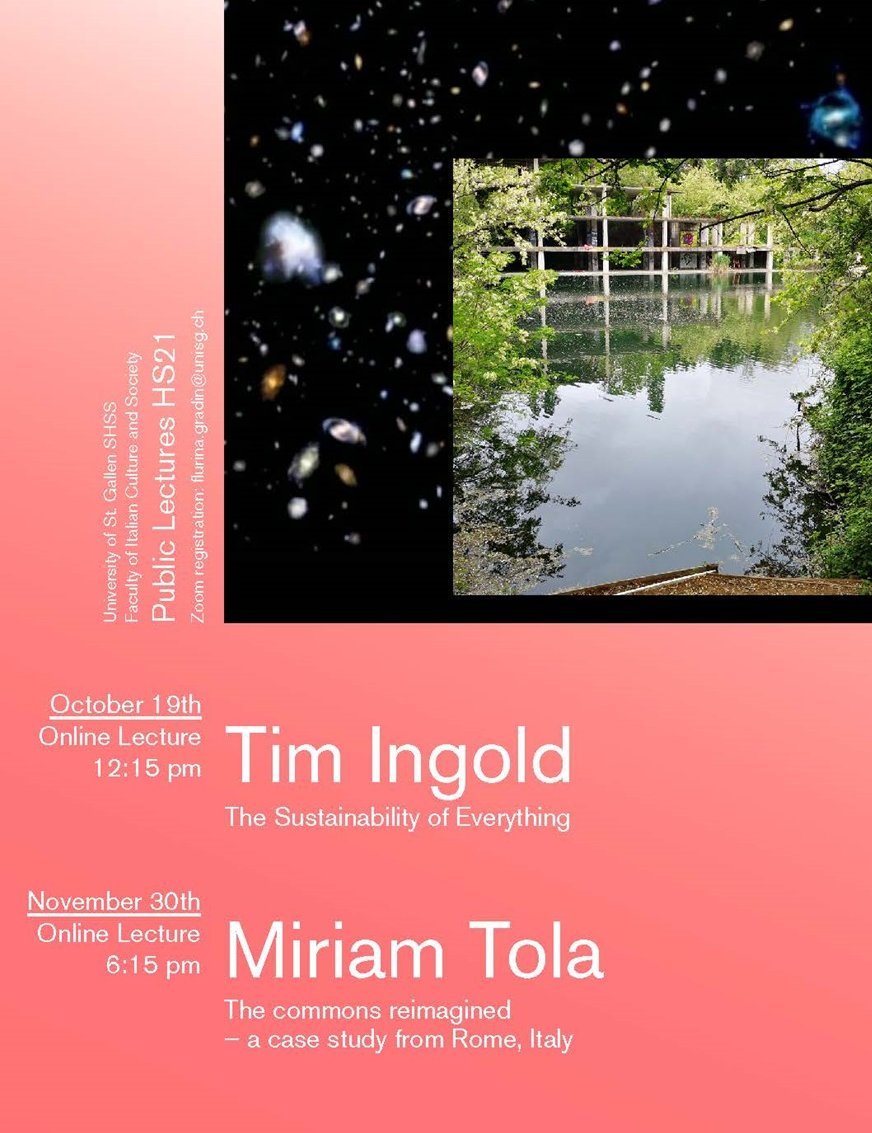
Public Guest Lectures HS21
Tim Ingold (em. Universität Aberdeen)
The Sustainability of Everything
Tuesday, October 19th 2021, 12:15-2:00 pm, University of St. Gallen (online lecture: registration)
Sustainability is about carrying life on, not about the achievement and maintenance of a steady state. Moreover if it is to mean anything, it must be for everyone and everything, and not for some to the exclusion of others. What kind of world, then, has a place for everyone and everything, both now and into the indefinite future? What does it mean for such a world to carry on? And how can we make it happen? To answer these questions, I shall take a closer look at what we mean by ‘everything’. I shall argue that it is not the sum total of minimally existing entities, joined together into ever larger and more complex structures, but a rather a fluid and heterogeneous plenum from within which things emerge as its crumples and folds. How, then, does such an understanding of everything affect our concept of sustainability?
Tim Ingold, FBA, FRSE, is Professor Emeritus of Social Anthropology at the University of Aberdeen. He has carried out fieldwork among Saami and Finnish people in Lapland, and has written on environment, technology and social organisation in the circumpolar North, on animals in human society, and on human ecology and evolutionary theory. His more recent work explores environmental perception and skilled practice. Ingold’s current interests lie on the interface between anthropology, archaeology, art and architecture. His recent books include The Perception of the Environment (2000), Lines (2007), Being Alive (2011), Making (2013), The Life of Lines (2015), Anthropology and/as Education (2018), Anthropology: Why it Matters (2018) and Correspondences (2020).
–
Miriam Tola (Universität Lausanne)
The commons reimagined: a case study from Rome, Italy
Tuesday, November 30th 2021, 6:15-8:00 pm, University of St. Gallen (online lecture: registration)
Once associated to a site of tragedy in mainstream environmental thinking, the commons have been reimagined asan alternative to extractive economies that deplete both territories and populations.Through the case study of an urban lake in a postindustrial area in Rome, Italy, this lecture explores activist commons that engage nonhuman beings as actors in projects that challenge neoliberal regimes of property and governance. Thus, it provides insights on the socio-ecological dimension of commoning.
Miriam Tola is assistant professor in Environmental Humanities at the University of Lausanne, where she is a member of the Institute of Geography and Sustainability. Her research explores the intersections of gender, race and nature in the political imagination of modernity. Her work has appeared in journals including South Atlantic Quarterly, Feminist Review, Environmental Humanities and Feminist Studies.
ItaliCHa 2021-2022 – Letture pubbliche delle cattedre di italianistica svizzere
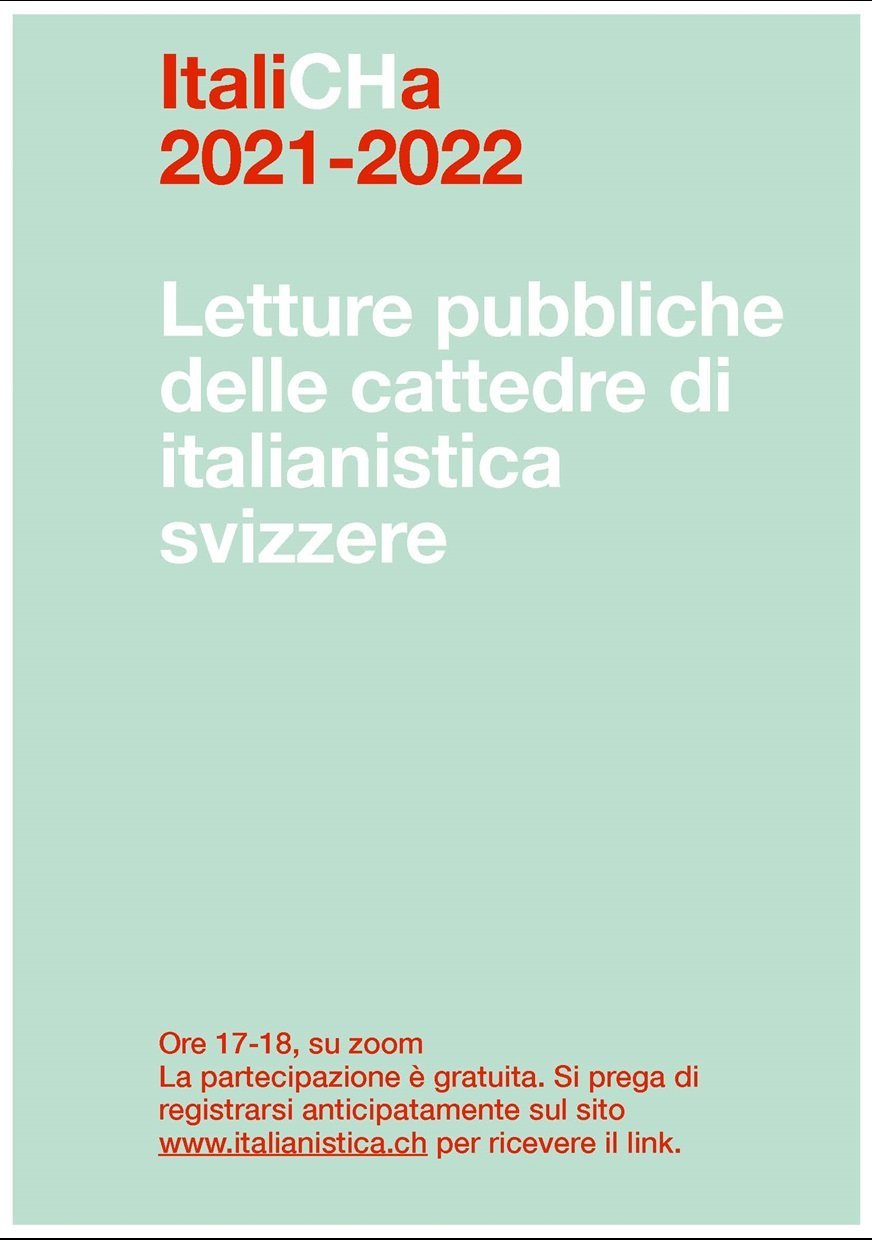
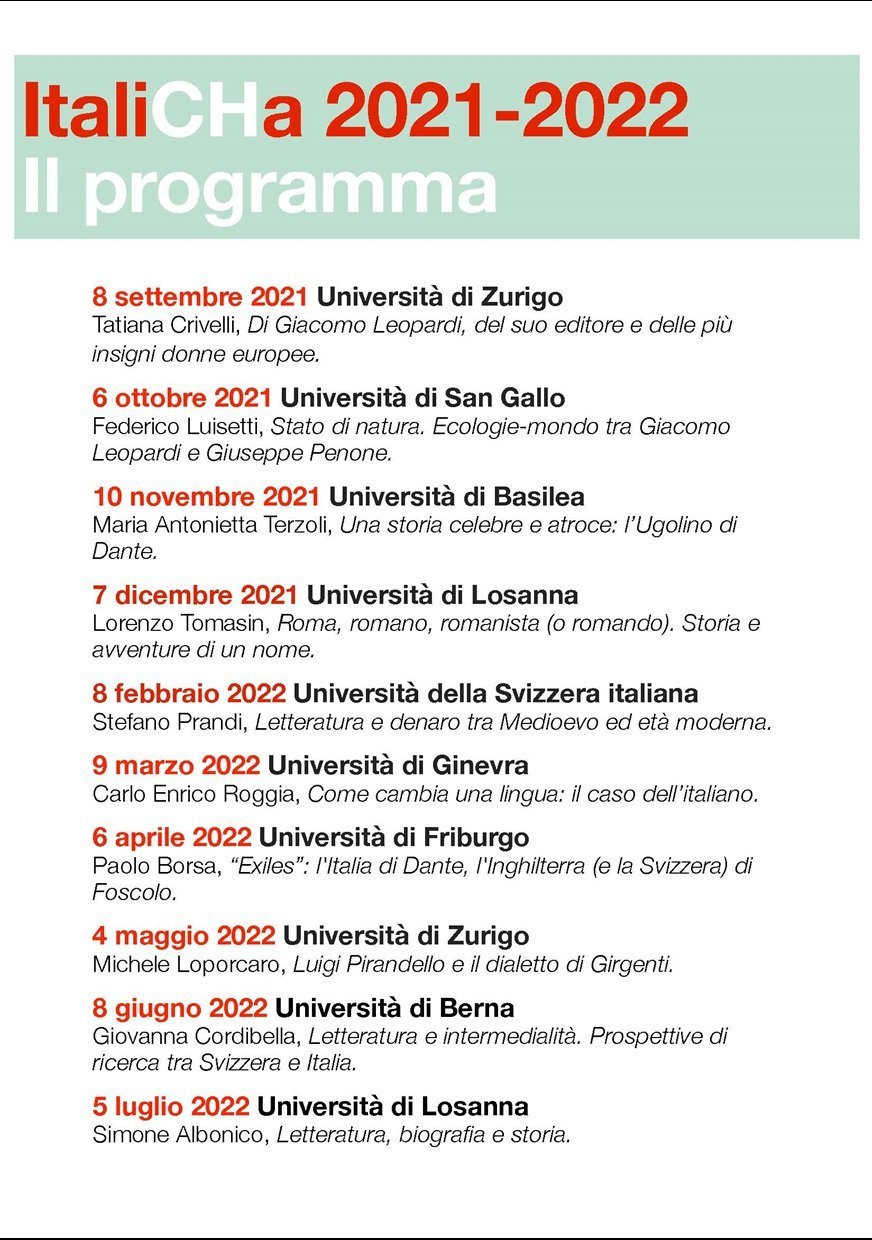
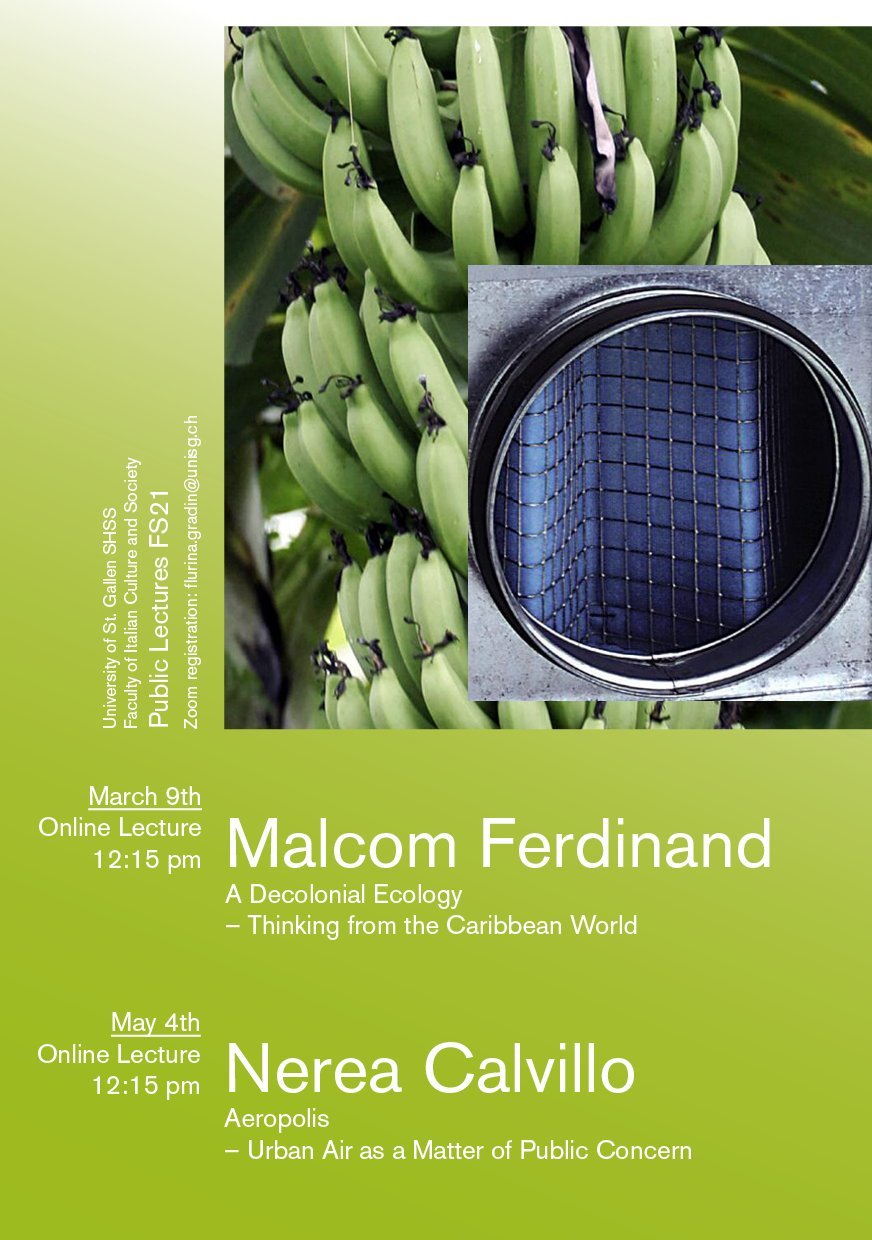
Public Guest Lectures FS21
Malcom Ferdinand (Université Paris-Diderot)
A Decolonial Ecology – Thinking from the Caribbean World
Tuesday, March 9th 2021, 12:15-2:00 pm, University of St. Gallen (online lecture: registration)
Behind its claim of universality, environmental thinking has been built on the occultation of the colonial, patriarchal and slavery foundations of modernity. Thinking ecology from the Caribbean world confronts postcolonial ecological thought with a region where imperialism, slavery and landscape destruction violently tied the destinies of Europeans, Amerindians and Africans. In his guest lecture, Malcom Ferdinand will introduce his concept of a "decolonial ecology" as an option to link ecological issues to the quest for a world emerging from slavery and colonization.
Malcom Ferdinand is a doctor in political philosophy from Université Paris Diderot and researcher at the CNRS (IRISSO). His research draws on the fields of political philosophy, political ecology and postcolonial theory, with a focus on the Black Atlantic and mainly the Caribbean. Malcom Ferdinand is the author of Une écologie décoloniale (Sueil 2019). In his work, he explores the relations between current ecological crises and the colonial history of modernity.
–
Nerea Calvillo (Centre for Interdisciplinary Methodologies, University of Warwick)
Aeropolis
Tuesday, May 4th 2021, 12:15-2:00 pm, University of St. Gallen (online lecture: registration)
Air Pollution is a matter of public concern. But what are exactly the political and social dimensions of environmental pollution or, more specifically, of “urban air”? How to render visible qualitative conditions of toxicity not through management or policy making, and beyond established forms of environmental activism? In her guest contribution, Nerea Calvillo will discuss her recent research and investigations on toxic politics, pollen and queer urban political ecologies.
Nerea Calvillo is an architect, researcher, curator and associate professor at the Centre for Interdisciplinary Methodologies (University of Warwick). The work produced at her office, C+ arquitectas, and her environmental visualization projects have been presented, exhibited and published at international venues. Her research investigates the material, technological, political and social dimensions of environmental pollution. This has led her to analyse notions of toxicity, digital infrastructures of environmental monitoring, DIY and collaborative forms of production, smart cities and feminist approaches to sensing the environment.
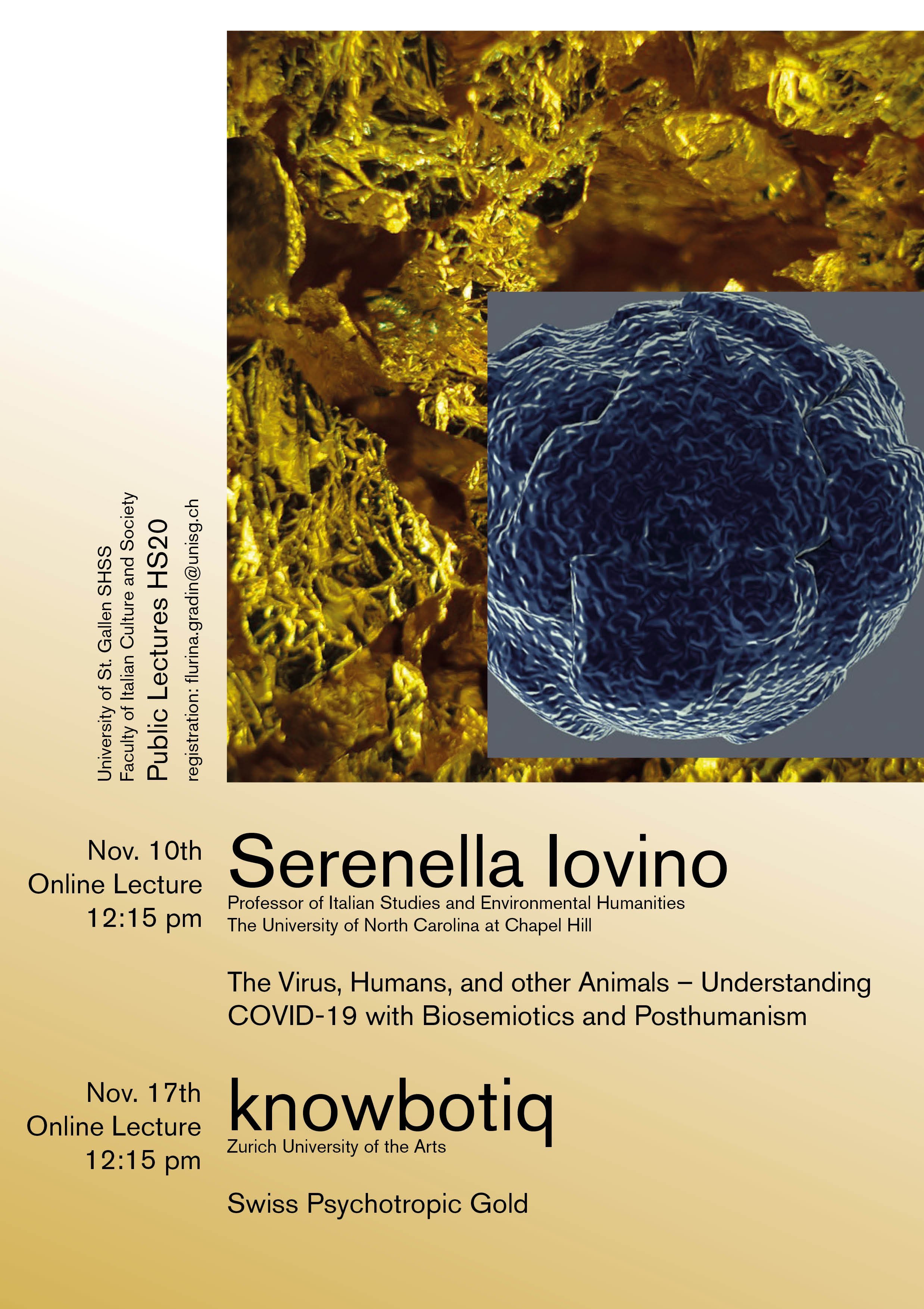
Public Guest Lectures HS20
Professorin Serenella Iovino (Università of North Carolina at Chapel Hill)
The Virus, Humans, and Other Animals – Understanding COVID-19 with Biosemiotics and Posthumanism
Tuesday, Nov. 10th 2020, 12:15-2:00 pm, University of St. Gallen (online lecture)
More information and registration
–
knowbotiq (Zurich University of the Arts)
Swiss Psychotropic Gold
Tuesday, Nov. 17th 2020, 12:15-2:00 pm, University of St. Gallen (online lecture)
More information and registration.
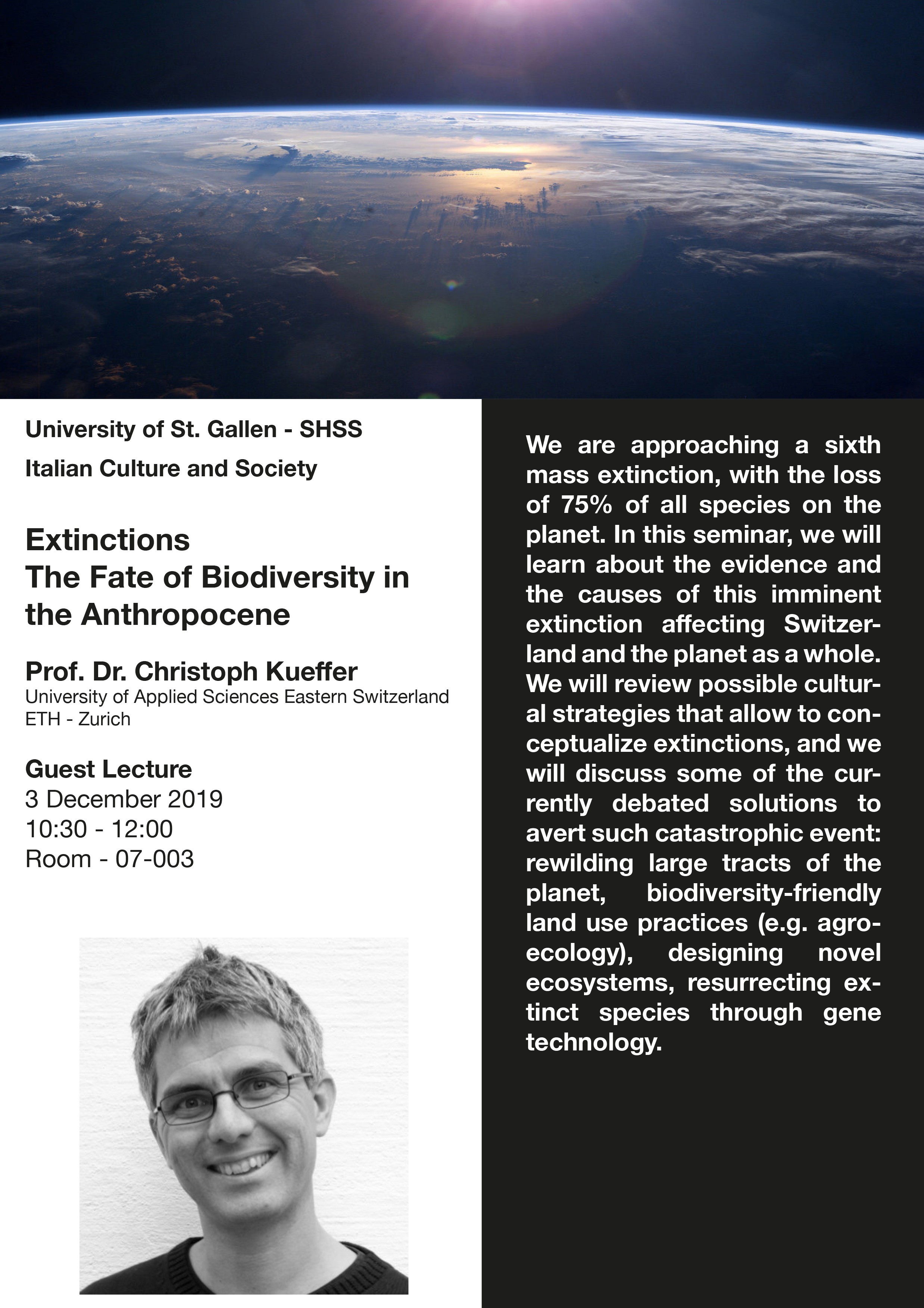
Public Guest Lecture HS19
Prof. Dr. Christoph Kueffer, ETH Zürich, Ostschweizer Fachhochschule OST
Extinctions – The Fate of Biodiversity in the Anthropocene
Tuesday, December 3rd 2019, 10:30 am to 12 pm, University of St. Gallen, 07-003 (main building)
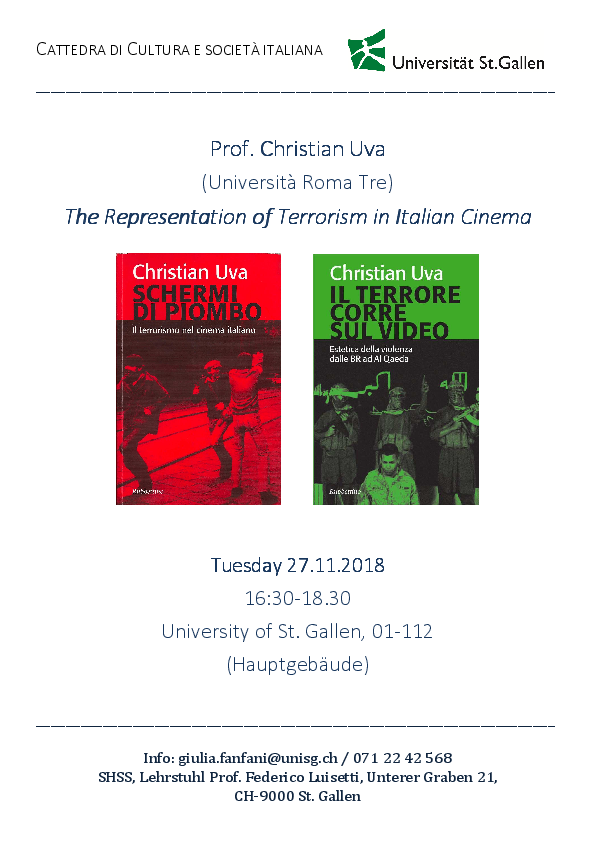
Public Guest Lecture HS18
Prof. Christian Uva
(Università Roma Tre)
The Representation of Terrorism in Italian Cinema
Christian Uva, Professor of Cinema and History at the University Roma Tre, will discuss the relationship between cinema and terrorism in Italy, concentrating on the political violence of the 1970s.
Professor Uva’s lecture, which is part of the course «Turmoil: Italian Literature, Culture and Politics in the 1960s and 1970s», will document the efforts by both popular and art cinema to express and interpret the tensions that have destabilized Italy through political violence, terrorism, massacres, and subversive plans.
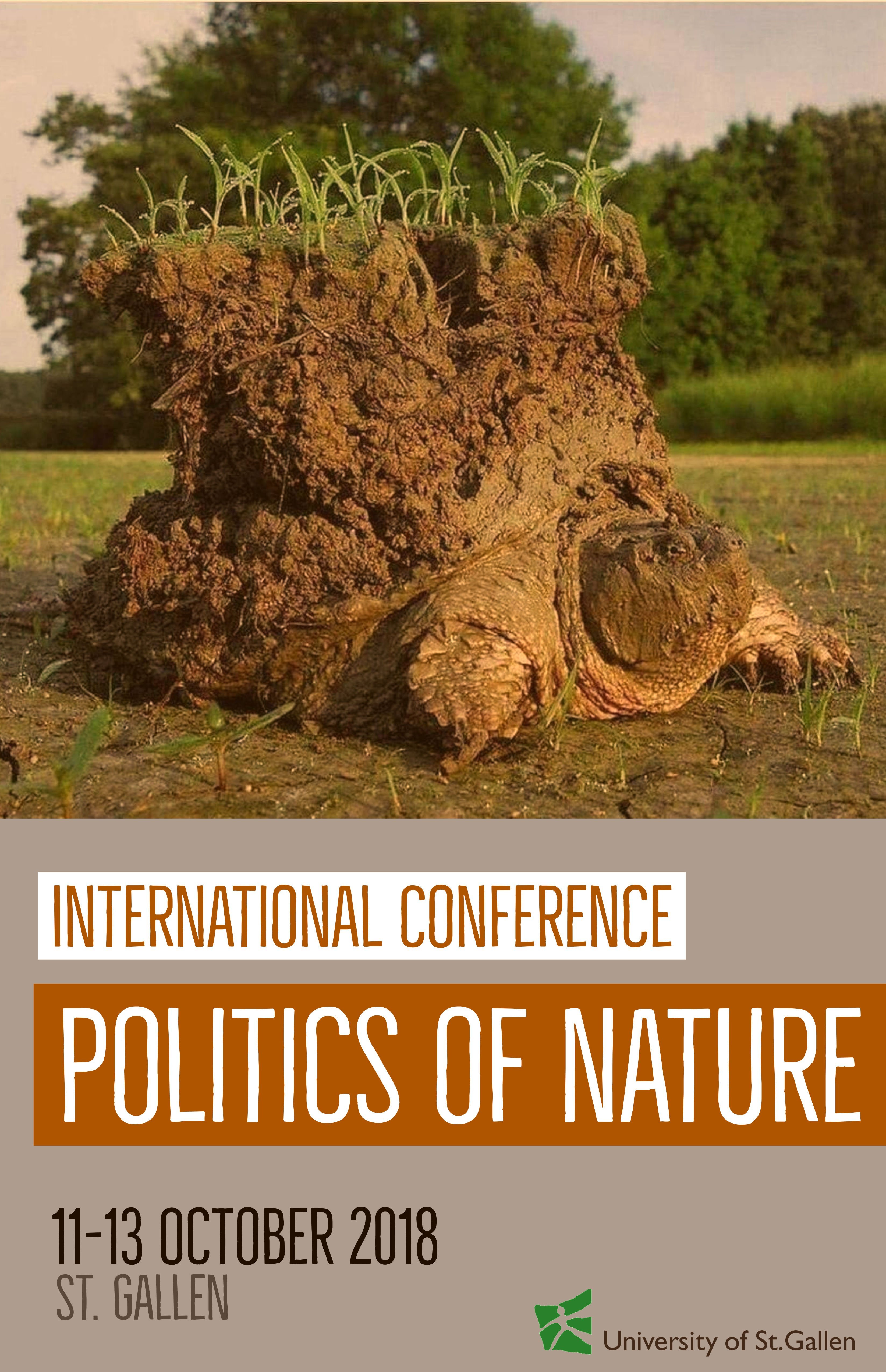
International Conference 2018
Politics of Nature
October 11th to 13th 2018
More information about the conference and program.
The purpose of the conference is to stimulate a cross-disciplinary reflection on the “states of nature” that are emerging from discourses centered on the threat of abrupt planetary environmental catastrophes, chronical conditions of ecological vulnerability, strategies of security, survival and adaptation, and the political and poetical imaginary of extinction and mutation.
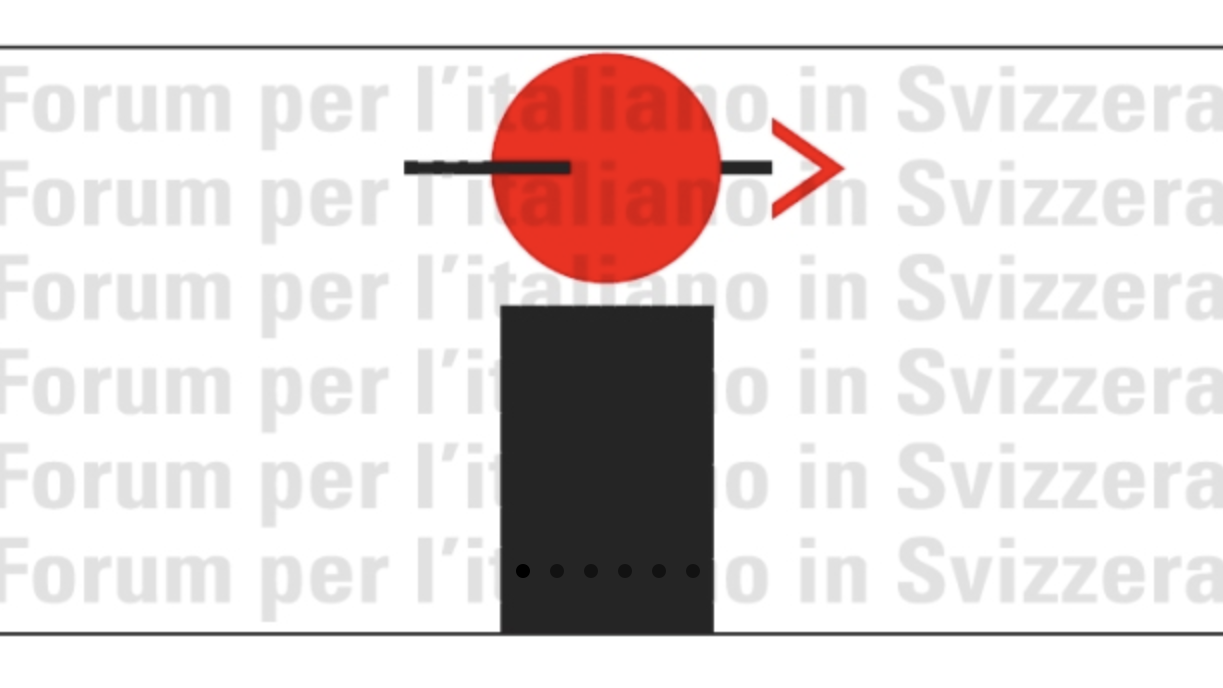
Conference
Italian Language and Culture Conference
March 23rd to 24th 2018
More information about the conference and program.
The faculty of Italian Culture and Society hosted at HSG the Conference «Anch’io parlo italiano», organized by the Società Dante Alighieri, the Italian Consulate, and the Forum per l’italiano in Svizzera.
